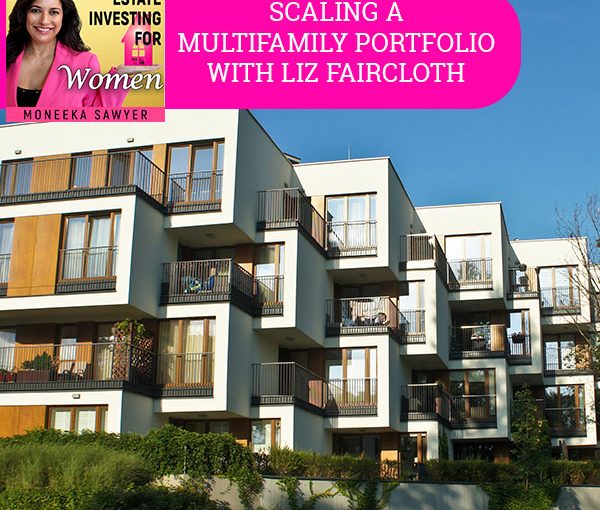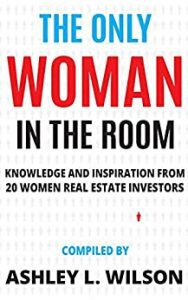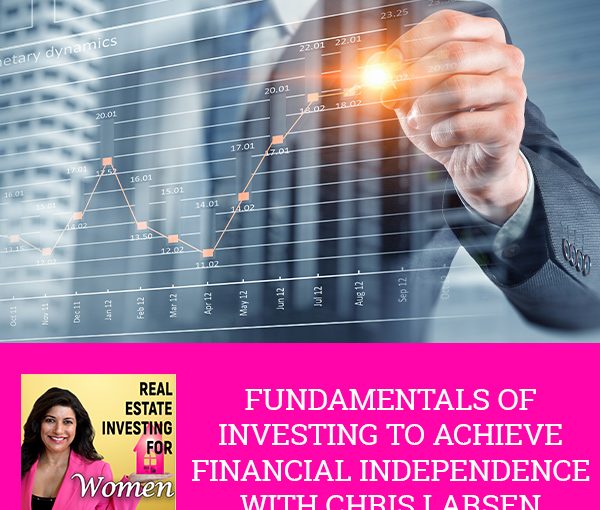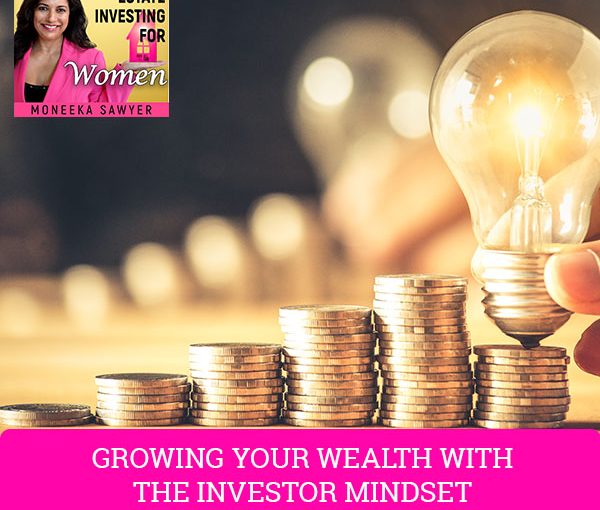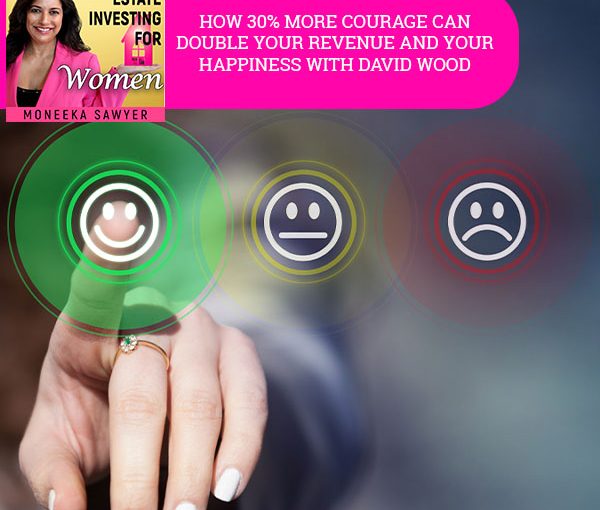Cashflow And Tax Strategies: What The Wealthy Do With Stephanie Walter – Real Estate For Women
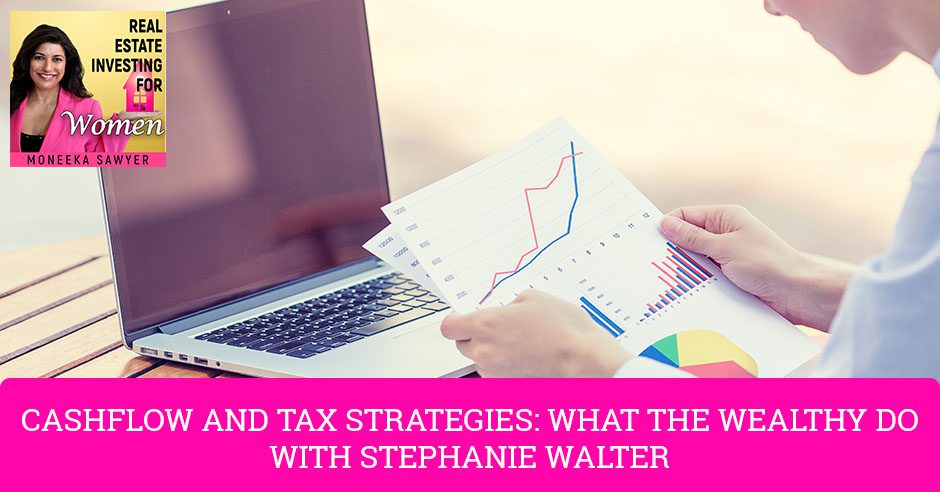
What do the wealthy do that makes them wealthy? We find out the answer to that and more in this episode. Moneeka Sawyer is joined by the co-founder of Erbe Wealth, Stephanie Walter. Stephanie talks about breaking away from corporate America and investing in real estate. She also shares insights learned from working with wealthy people, offering great cash flow and tax strategies that can give you the push towards their direction. Tune in to learn more tips from wealthy investors.
—
Watch the episode here
Listen to the podcast here
Cashflow And Tax Strategies: What The Wealthy Do With Stephanie Walter – Real Estate For Women
Real Estate Investing For Women
I am excited to welcome to the show, Stephanie Walter. She is the CEO of Erbe Wealth and a legacy cashflow specialist, capital raiser, syndicator and real estate investor. She has been a financial educator for many years and a real estate syndicator. Stephanie’s passion is teaching people to unlearn what most of us have been wired to think about money and re-educating people on attaining wealth that can be passed on to the next generation. Stephanie, welcome to the show. How are you?
I’m great. Thank you so much for having me.
I am excited about this conversation because there are many myths, ideas and lies that we are taught about money. I hope that’s not too strong a word but it’s awesome to have somebody come on board that’s going to share some of their wisdom around this. Before we get started, could you tell us a little bit about your story like how you got to where you are?
I started like most people into the corporate world out of college and realized not too long thereafter, when I was continually getting these 2% raises that, “This was not for me.” I quit my job and started an insurance agency in 2006. I’ve always loved real estate. I never had much training to it, so I went out and bought a lot of single-family homes and learned by my mistakes and successes on how to do that.
I decided I wanted to scale up in 2016 and get some great education and learn more about possibly buying apartment complexes or commercial real estate. I got into RE Mentor, which is an education program, like getting your Master’s in Real Estate. I did that and completed my first syndication in 2016. After that, I started getting to know people and became a partner with someone who didn’t like to raise money.
I started raising money at that time. Ever since I’ve worked a lot with wealthy people, I and that’s learned a lot from working with them about how they use their money, unlearning everything we’re all taught as fact. I transitioned a lot of my assets, doing what they were doing. I sold my day business, which is insurance and I’m retired. Other than I’ll continue to raise money. I like to teach people about what I’ve learned because I believe my path is definitely doable for everybody.
Could you share with us some of these things that you learned from wealthy people? What is true about wealthy people is they do think differently about money and investing than other people. What’s also interesting is how we define wealthy. I want to give a little bit of my perspective also on this and that. I live in California and people are impressed with the income that we make and the net worth that we have, but for a Californian, we’re upper-middle class.
Wealthy people live in a pretty average house. They drive pretty average cars, but their net worth is pretty impressive. Share on XWe’re not the wealthy around here. The wealthy around here are more like Bill Gates, Bezos and Zuck. Even though I’ve had a huge education in building wealth, my dad was a great mentor even as a young person, but still, I don’t think that I even have that real wealth mindset because I’m not a wealthy person in my community. I’m eager to know about people that define themselves as wealthy. What are those things that they do differently than the rest of us?
What’s interesting about that and you probably know that from where you live is that you’re not always going to recognize a very wealthy person. A very wealthy person, a lot that I deal with, you would never know. They live in a pretty average house and drive pretty average cars but their net worth is pretty impressive. The thing that you noticed by going through their finances pretty clearly is that they invest largely in real estate.
That’s the bulk of their investments. They invest directly in businesses, not in mutual funds. If they invest in the stock, it’s usually, “I got this tip from so-and-so.” It’s almost like their fund money but what they’re very concerned with doing and what they would probably tell you is that cashflow to them is more important than net worth.
There’s a perfect example of what you’re saying in your community is that you’ve got a lot of people that probably have very significant net worth but yet they may be working paycheck to paycheck to keep that lifestyle where it is. Whereas someone who’s wealthy is very concerned with cashflow that the cash flow is building up enough.
It replaces their income so that they can do what they want and love to do to contribute to society. The biggest thing that I learned is that most wealthy people don’t talk a lot about their net worth, even though it probably is pretty impressive but cashflow to them is huge. I learned that lesson myself because I live in Colorado. Colorado’s changed a lot. I started investing here in 2005 and needless to say, the prices have gone up unimaginably.
On paper, I had a very good net worth but I still had to work and continue running my business because I did not have a cashflow strategy in place for this money and I wasn’t very concerned with what my money was doing. Wealthy people know what their money is doing for them. They want the money to be working at all times for them. They view money as a tool that is working for them. That’s a mindset thing.
Until I transition different assets around to see how they were performing and analyzing, “What is my money doing for me?” It was largely inequity and it had a return of zero. To transition that into assets that would pay cashflow, as well as have a good interest rate return, that doesn’t take long to do that to have the goal of having the cashflow for you to be able to be truly wealthy, whatever that looks like for you.

What The Wealthy Do: Most wealthy people don’t really talk a lot about their net worth, even though it is probably pretty impressive, but cash flow is huge.
Talk to me a little bit about how that might translate for people that are not yet wealthy. How can they adopt those mindsets when so much of the time so many of us are living paycheck to paycheck and trying to survive but that wealthy mindset is available to us? Could you talk to us a little bit about that?
That’s another thing that I became pretty aware of when working with wealthy people is that they have a view that money is abundant. That sounds small to people but think about your view on money. Do you view money as, “There’s only so much of it and if I take some money from someone, then I’m making someone else less wealthy?”
They view money as a stream of water and that money is always flowing, abundant and coming. I didn’t probably have a mindset about money but once I did learn about the abundance mindset, I made a point of changing that. That sounds small but if you believe that money is flowing and coming, then it gives you a different perspective on money.
You say that’s small but it’s huge. That mindset tweak is huge. I was explaining this to a friend of mine and I got this image in my head that money is a little bit, rather than being like a stream where it’s inflow, it’s more like a fountain where it comes in, goes up and down, then it comes back in. It’s this circular thing. The power of the pump that makes that go is your willingness to circulate.
I donated to a woman I met $1,000. Everybody else was donating $10. Why did I do $1,000? To me, $1,000 is part of that pump. It’s more going out. That means that more will come in. The pump is stronger because there’s more circulating. Please forgive me. I hope that didn’t sound like a brag. Don’t spend beyond your needs. I’m not saying, “Go spend a ton of money.”
I’m saying that the circulation of money is imperative to creating wealth, community and to uplifting people. Unless money is going out, they are not jobs. Unless those people are not spending, there’s not a community. There’s nothing for us to do together. This is an interactive thing. All of us benefit from the spending and earning of money.
It’s not a zero-sum game this. Even for me, I came home and I was like, “That was such a great visual.” I want a strong pump in that fountain so that the circulation of that wealth is bigger, impacts more, stronger and more fun for me too. I like a powerful fountain. Does that sound right to you or do you feel like something is in there that doesn’t work?
Cash flow is more important than net worth. Share on XThat’s a great analogy. Something that offshoots from is that, granted there are stereotypes and all of that but wealthy people I meet that have been successful are very giving. It’s that same abundance mindset. There’s plenty for me to help you get. What I find very interesting about wealthy people, as opposed to the average person who does the 401(k), is they put their money into this because they’re told that’s what they need to do, a wealthy person invests their money teams of people and ideas.
Let’s use real estate as an example. They find a project that is compelling and interesting. They’ll do their due diligence but they’ll look for a team that has experience who has proven themselves to be successful. Then they’ll put their money into that team, step back and let the team do their thing. They’ll check in on the reports but largely, they’re passive.
Wealthy people invest in business plans and directly in the business. Whereas, us with a 401(k), who knows where our money is invested in? It’s invested in maybe thousands of companies that we know nothing about. They’ll invest their money directly in a business, someone’s business and, “What is this person’s business plan?”
It’s the same thing. They do all their due diligence but they invest directly to people and in people, more than a 401(k) or throwing your money out there and hoping that it grows but you’re not sure what you’re invested in. The wealthy are very conscious of who they’re investing in, where their money is and what it’s doing at all times.
Would you say that approach is true in real estate too for them?
Yes. I find that they don’t want to be the landlord and be managing. They want to understand the exit and business plan for this particular property and then they want to invest in it. They’ll sit back, review the quarterly reports, collect their monthly distributions of cashflow and do the same thing with another investment that comes along.
Talk to me a little bit about debunking these myths. What are those myths that you learned about from these people that we learn the opposite so much of the time?

What The Wealthy Do: Money is always flowing. It’s always flowing, and it’s always abundant. It’s always coming.
I’ve gone over a few of them already but big one is 401(k)s. That might not be a popular subject but I believe that we have to take a look at why we do things and if these things that have been set up for us by I’m not sure who work to our advantage or not. The thing that brought my attention to that is I look over lots of wealthy people and their financial statements. Virtually none had 401(k)s.
That was eye-opening because I was like, “What? I didn’t understand.” It didn’t compute to me. That’s a large myth and then you have to look in more closely. It makes sense because wealthy people want to know what their money is doing at any and all times. They want to know the returns that they’re generating and also what they prepare more than we do for taxes. By not preparing for taxes, that’s a huge thing that the majority of people don’t do.
If someone tells you how much they have in their 401(k), do they have that much in their 401(k)? In twenty years, what is the tax rate going to be and how much of what they have is going to be taxed? To simply not address your tax and mitigate for your taxes, it’s something that the wealthy do all the time. I use the analogy of these two people playing a game of chess and the regular Joe investor is looking one move at a time.
He’s looking, “How are my investments doing? What is the return?” While the wealthy person is looking several moves ahead. They’re checking, “How are my investments doing? On the other hand, what is my exit strategy? How can I mitigate for my taxes?” They’re looking side by side for income and taxes. That is why wealthy people get wealthy.
The myth that I understand there was saving your 401(k), your taxes will be less when you are finally pulling your money out. Don’t worry about that piece. You’re doing a tax-deferred type of program and you’re going to defer it so that you’re paying taxes later. In your experience or from what you’ve seen from the wealthy people, is that true that tax rates will be lower later?
No. Any of us can see what’s happening in our country regardless of what’s happening politically. We know that we’re spending a lot of money and in a lot of debt. People may not know this but our tax rates are on the low side. Historically, they’ve been much higher than they are. We know that the tax rates are going to change in the future. Are you prepared for that?
The tax rates are going to change but I also think that people don’t want to live a lesser lifestyle when they retire. For example, personally, I’m not going to want to retire until I can have the lifestyle that I have now without the work. What does that mean for me? I’ve got this lifestyle with this house and car and this excitement and joy for travel.
Wealthy people know what their money is doing for them. And they want the money to be working at all times for them. Share on XNow I’m not working, so I’ve got more time to travel more, hang out, hopefully take care of my parents more and my own health stuff. If I’m to look at my retirement, I’m going to say, “I need 50% more than what I’m making, at least, in order to continue to benefit from those many years of work.” I don’t want to have my lifestyle go down and be able to afford less.
Whatever my retirement vehicles are, if I’m pulling more than what I’m doing now, even if tax rates stay exactly the same, my tax rate has not gone down. It’s exactly the same. I’m not paying less taxes later but same tax. If the tax rates go up, now you’re paying even more. This whole idea of deferring taxes is an okay strategy.
Be aware that you’re not going to be paying less taxes later. You tell me what you think of this. You have money going in that’s compounding without being taxed, so it happens more quickly. You’ve got more on the backend, supposedly. That’s a compounding and a great investment strategy for growth, possibly depending on what you’re doing with it but it’s not necessarily a tax strategy.
I don’t want to tell everybody to get rid of your 401(k)s. A lot of people are into them but what I do say is be aware of what returns you’re getting. What fees are you paying? I ask a lot of people and they’re not aware of these things. You’ll look at the prospectus and what they’ve made over the last years. Sometimes it’s like 3% or 4% after fees.
I bring that to their attention and they were not aware of that. They’re looking at the long-term of what they think will be projected for them but it’s important to do things that will lower your fees especially, but also get the maximum growth that you can. People try to put off the financial responsibility onto whomever that is, whether that’s your Merrill Lynch person or the 401(k) administrator at your work.
Be more interactive with what’s going on, know what your options are. If you want to take part of your money from your 401(k), there are ways of investing some of that money, setting up a self-directed IRA and investing in real estate. There are other things that you can do and I honestly don’t have a preference but I want people to know that you should be in control and you probably know more than these professionals that are managing your money.
I want to do a deep dive into the analysis of a 401(k). Would you be interested in doing that with me on EXTRA?

What The Wealthy Do: Don’t be afraid to dive in, educate yourself, and learn that there are other investments outside of the stock market.
Sure. Thank you.
I want to dive deep because we have been trained. You’re so funny. You’re like, “I don’t know where that comes from,” and we all know that it was marketing. Somewhere along the way, this marketing trend started but we should not be subject to marketing only. We have the opportunity, with all the financial education that we have out there now to take a look at that. I’d love to do that in EXTRA. Do you have a way for people to reach you?
I get a lot of the same questions asked of me over again. I set up a group of question and answer videos. I keep adding to it every week. Hopefully, I’ll get up to about 100 of the most commonly asked questions. You can go to AskStephanieNow.com and you can get onto my website and look through some of those questions and answers. My actual website is www.ErbeWealth.com. There are tons of content. I find it very rewarding to be able to educate people. I’m constantly updating the content because I view this as my purpose in life. There’s plenty of reports, eBooks and all that great stuff.
I wanted to mention that there is a gift if they go to your website. That website is ErbeWealth.com. Tell us a little bit about one of the free reports people can get.
I have a report. It’s the Investment Report: Five Reasons Passive Investing Might Be For You. It’s a great dive into all the reasons that you may consider an investment that gives you a passive income every month.
Thank you for that. Stephanie, I have three Rapid-fire questions. Give us one super tip on getting started investing in real estate.
A wealthy person invests their money in people. They invest in teams of people. They invest in ideas. Share on XThe biggest tip I can give you is probably a mindset tip that you can do it and not be afraid to get educated. There’s so much information out on the internet about learning these investments that used to be reserved for very wealthy people, banks and insurance companies that are now available to us average people. The only reason that is the case is because of the information available on the internet. Don’t be afraid to dive in, educate yourself and learn that there are other investments outside of the stock market.
What would you say is one strategy for being successful in real estate investing? If you’re already in it, how do you be successful?
It’s setting goals. That’s a simple answer but it is true. When I started, I envisioned, “How could I retire?” I reverse engineered that back to, “How much do I need to come in every month?” From that, then I viewed money that I had and, “What is this money doing for me?” From that, I was able to eventually get enough money to replace my income.
Just having goals, maybe they don’t have to be that big and it’s, “I would like to do one and become alternate investment a year to see how this changes our lifestyle in terms of the passive income and the tax savings that you would get.” Be consistent. Whatever you’re doing, keep at it. I remember when I started investing in real estate, I was like, “I’m going to invest in one single-family home a year.” Have some goals and direction of what you see for your future and then act on it. I see lots of people that talk about it and don’t ever act on it. You go to act on it.
What would you say is one daily practice that you do that contributes to your personal success?
I blocked time for myself. That sounds very simple. Especially if you’re a mom or you’ve got lots of stuff going on. If you can block yourself time, let’s say, “I want to accomplish these three things,” or whatever they are and you know that you get that done every day. That’s going to move you ahead towards your goals.
This show so far has been amazing. Thank you so much for all that you’ve contributed. I can’t wait to get to EXTRA.
Thank you. Me too.
Ladies, stay tuned with Stephanie and me for EXTRA. We’re going to do a deep dive on 401(k)s and why that may not be the best investment for you and for a place to put your money. We’re going to talk about that. If you are subscribed, stay tuned. If you’re not but would like to be, go to RealEstateInvestingForWomenExtra.com.
You get seven days for free. Check it out and then you can stay on board or not. It’s up to you. For those of you that are leaving Stephanie and I, thank you so much for joining us for this portion of the show. I appreciate you and I look forward to next time. Until then, remember goals without action are just dreams. Get out there, take action and create the life your heart deeply desires. I’ll see you soon. Bye.
Important Links
About Stephanie Walters
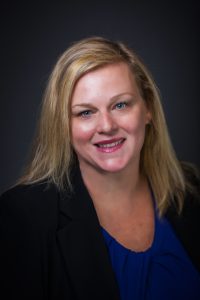
Love the show? Subscribe, rate, review, and share!
Join the Real Estate Investing for Women Community today:
______________________________________
To listen to the EXTRA portion of this show go to RealEstateInvestingForWomenExtra.com
To see this program in video:
Search on Roku for Real Estate Investing 4 Women or go to this link: https://blissfulinvestor.com/biroku
On YouTube go to Real Estate Investing for Women
Moneeka Sawyer is often described as one of the most blissful people you will ever meet. She has been investing in Real Estate for over 20 years, so has been through all the different cycles of the market. Still, she has turned $10,000 into over $5,000,000, working only 5-10 hours per MONTH with very little stress.
While building her multi-million dollar business, she has traveled to over 55 countries, dances every single day, supports causes that are important to her, and spends lots of time with her husband of over 20 years.
She is the international best-selling author of the multiple award-winning books “Choose Bliss: The Power and Practice of Joy and Contentment” and “Real Estate Investing for Women: Expert Conversations to Increase Wealth and Happiness the Blissful Way.”
Moneeka has been featured on stages including Carnegie Hall and Nasdaq, radio, podcasts such as Achieve Your Goals with Hal Elrod, and TV stations including ABC, CBS, FOX, and the CW, impacting over 150 million people.
Scaling A Multifamily Portfolio With Liz Faircloth – Real Estate For Women

Investing in real estate is a learning process. From buying your first property to scaling a multifamily portfolio, investors learn many lessons in between. In this episode, Moneeka Sawyer sits down for a discussion with Liz Faircloth, a social worker, entrepreneur, co-founder of The DeRosa Group, and co-founder of The Real Estate Investher community. Liz shares how she got into real estate investing and talks about what she learned about investing in many types of real estate. She shares why they settled on multifamily and what you need to do to become successful in the real estate game. Tune in to learn more on what it takes for real estate investing success.
—
Watch the episode here
Listen to the podcast here
Scaling A Multifamily Portfolio With Liz Faircloth – Real Estate For Women
Real Estate Investing For Women
I am so excited to welcome to the show, Liz Faircloth. Liz Faircloth co-founded the DeRosa Group in 2005 with her husband, Matt. The DeRosa Group based in Trenton, New Jersey is an owner of commercial and residential property with a mission to transform lives through real estate. DeRosa has vast experience in bringing properties to their highest and best value, which includes repositioning single-family homes, multifamily apartment buildings, mixed-use retail and office space. The company controls close to 1,000 units of residential and commercial assets throughout the East Coast.
Liz is the Co-founder of The Real Estate InvestHER Community, a platform to empower women to live a financially free and balanced life through over 25 Meetups across the US and Canada, and an online community and membership that offers accountability and mentorship for women to take their businesses to the next level. She is the co-host of The Real Estate Investher Show, which I will be on too. They published their first book, The Only Woman in the Room: Knowledge and Inspiration from 20 Successful Real Estate Women Investors.
Liz has been interviewed for many articles and top-rated podcasts, including mine. Including being a two-time guest on the top-rated BiggerPockets Podcast and the Best Ever Show. On the personal side, Liz is an avid runner, has completed several triathlons and marathons, has two adorable children and is a New York Mets fan. Hello there, Liz.
Thank you so much for having me.
You and Andresa do so much cool stuff with the InvestHER Community. I love what you’re doing together but I haven’t really gotten to chat with you about what you’re doing. Liz, why don’t you give us a high-level version of your story of how you got interested in real estate and what your path has been?
It wasn’t a linear path. At the time, my now husband and I had started dating. Before we started dating, I was in graduate school for Social Work. I got my Master’s in Social Work. I want to open my own practice and help people. That’s been always my passion. During that time, my brother-in-law who was the only entrepreneur I ever met, grew up in a great family but middle-class family. My dad was a teacher. I was never introduced to entrepreneurs or investors, that just wasn’t in my sphere of any context growing up. Hard work ethic was there, but certainly the business piece of it, I was not familiar with or didn’t have a lot of exposure to.
Until I met my brother-in-law, who was an entrepreneur, started a business and handed me Rich Dad, Poor Dad. I’m 23 at the time and he’s like, “You have to read this.” I’m like, “All right.” I like personal growth books. I started in college reading different books and I always enjoyed them. I like learning and growing. Long story short, I read that it. My eyes were opened to this idea of passive income. I honestly never heard of that before. It’s like, “I can have money working for me, not me working for money.” It was a whole new, open-my-eye concept, which I know a lot of people have said.
What got us involved was
I then started dating my now husband. We lived about two hours from each other. Every weekend, we go to all the REIA meetings and start learning. We’re in our twenties, didn’t know anything. We didn’t have any money to invest, but we said, “Let’s give this a go.” We started taking courses. This is before Facebook Marketplace. This is literally open the newspaper, go to ads and call tired landlords. That was the million-dollar tip we got at one of the events. That’s what we did every weekend, literally knocking on doors, right outside of Philadelphia, where my husband lived and when I visited him.
One day, we got someone to say, “That’s interesting. Let me think about that.” Then we called them back and struck up a deal. A year into us taking courses and door knocking and cold calling and bootstrap whatever we could do, we struck up a deal and bought our first property. It was a duplex about $150,000. We learned everything on that property. We’d go with the people. When you buy a property, the tenants that are there may not be your tenants ongoing because there’re a new sheriff in town. The whole multifamily opened our eyes. There are only multis in this neighborhood. It wasn’t like we chose a duplex. It just so happened because it was like older homes right outside of Philadelphia. There were only duplexes and small multis. We got our start there and then we moved to New Jersey and then started our business focused on New Jersey and buying properties there. We sold that property and did 1031 into a four-unit, then that started our trajectory in New Jersey.
Over the fifteen years I’ve been doing this, we had lots of twists and turns. I wish we just focused on multi but we didn’t. We got involved a lot of different things early on. People would get distracted as we usually do. We were probably a little naïve and young. We flipped houses, we got into tax liens, we bought a commercial building, we bought raw land. Every random thing you could possibly think of, we probably have done it, until we doubled down on multifamily. Our business now is focused on multifamily. We went from a 2 duplex to a 10-unit. We grew very steadily. We didn’t go from a 2 to a 200-unit. We did, but over time.
Now, we focus on larger multis and we’re starting a fund where we’re actually investing with other operators. We’re diversifying a little bit outside of multi but more like from a funding perspective. I’m involved in that, not day-to-day, but more from like a strategic level and helping build our team out. It’s exciting to be able to invest in different sectors of real estate, not just multifamily. We do love multifamily. We have a letter of intent on a property in the Southeast, which is where we are focused on now.
Tell me a little bit more about this fund. Let’s dive a little deeper in that.
You want to make sure you're mitigating risk for yourself, but most importantly, your industries. Share on XIt’s something that we’ve talked about over the year and then COVID obviously happened. COVID happened, the pandemic and everything. You’re in California, I’m in Pennsylvania. We’re in the thick of shut downs. I know things are opening up, which is wonderful and people are getting along. All the conversations we had were like, “How’s this going to affect our buildings?” I have to say with our multifamily, any loan that came out, we took advantage of. We didn’t know how it was going to affect. We didn’t know who’s going to be able to pay. We didn’t know what’s going to happen with tenants and everything like that. Our buildings, knock on wood, the ones that were doing well are stable and have thrived during COVID.
We had a building in North Carolina that was 40% occupied. It was literally a turnaround building. It was 200 units. We got it up to 90% during COVID. Some of these buildings thrived. Other buildings that were having some issues prior to COVID continued to have some issues. While that was a stable sector for us, we’re all in on that sector. My husband and I talked a lot about as we grow our businesses, what do we want to do? We want to diversify and the importance of that, and what does that look like? The fund is an opportunity. We’ve always focused on raising money and then putting it specifically into a building, into a project.
With regards to the fund, we talk to people all the time. People are like, “This sounds like a great opportunity to pass an investor.” Then you’re like, “I don’t have a building. I don’t have anything under contract right now.” We refer them. We know a lot of people we like and respect in the business. We have no problem with that. There are a lot of good syndicators out there. We wanted to have another flavor of ice cream, if you will.
The fund will obviously be an ongoing rolling fund, and it will give investors what we’re going to actually invest in are all things that we know, and that we’ve vetted it. We’re not going to start investing in a business that we have no idea because that’s a whole other level. It’s like mitigating risk. We want to mitigate your risks. You want to make sure you’re mitigating risk for yourself, but most importantly, your investors. Hard money loans, that will be one. We’re going to start to work with maybe the hard money operators that we like and respect that we know do good business. We’re not the hard money loan lenders. They are, and we’re going to do that. Multifamily will be a piece of it. If we have a project that comes up, we’re going to almost invest in our own projects and that will be a piece of it.
Those are the two main pieces. I want to say even like self-storage and those operators, that might be another sector. They’re related to investing in real estate on some level, but it will be in a way that we are not the sole operators of everything. As we evolve, you don’t want to do everything yourself. You want to be able to do what do you do well. Once you figure that out, you have to focus on that. That’s what that looks like. We’re building out a team and that’s been in the making for some time, but that’s the goal.
I’m fascinated by that idea because I feel like, for me too, there’s something that I do really well. I do executive homes in the Silicon Valley. I’ve got my entire systems. It’s all built out. It runs itself. I don’t worry too much about it. I was telling you before that I’m taking all of my May off for my birth month because that’s where my birthday is. We’re traveling to Hawaii and I’m going to a spa in Palm Springs with my sister. We had our vaccinations, we’re all taken care of, we’re doing our tests, everything’s good. We’ve decided that it’s time to celebrate. That lifestyle is fantastic. I’m not particularly interested in working significantly more. I do get boards, we have construction projects, we have some other stuff going on so that my entrepreneurial mind doesn’t slow down or get bored.

Multifamily Portfolio: What commercial brokers care about is if you’ve closed deals, they do not want to work with people who are going to get to the finish line and not be able to pull the money together because they want their commission.
What is happening is I found several different syndicators doing different things. I’ve invested in storage, multifamily and a variety of different things. I often wondered because each time that I invest, and I don’t know how this is going to work for you guys, but every single time I invest, it’s a minimum of $100,000. That’s great for us because we have that money, we’re looking to retire, we’re moving that way, but not everybody who’s reading this has access to $100,000 for this and $100,000 for that. They want to be able to diversify without spending that much money. What does that fund look like for you? Is there going to be a minimum investment? Have you worked that out?
I think we’re still working that out. One of the key team members that we knew that we needed, it’s not how but who. You can start to build out different businesses, you can’t know everything. I don’t want to know everything quite honestly, that just hurts my brain a little bit to know everything. We’re women, we want to know everything. Anyway, one of the people that is a key principle in this endeavor is a fund manager from Wall Street who has run funds. As we’ve talked to him, I think the minimums are going to, I’m not sure exactly. I will say though, one organization we’ve started working with is called Republic. Basically, what they do is they in essence have a similar type of approach, in that people can invest $10,000, even down to $1,000. Don’t quote me on that, but I’m not familiar.
What’s fascinating though for our last indication was a 336-unit apartment building. Our minimum was $50,000 on that project. Not everyone has that but they want to invest in real estate. We found this company and what they’re doing is they’re the investor in that project, but they’re the ones going out to the accredited investors to then say okay to all pooling all this money together. Then they are the investor in that project with us. They’re all pooled in this together in this company called Republic, then Republic is ultimately the investor, if that makes sense.
It was cool because that was the first time we had ever done that. If you think about it, we have a 336-unit apartment complex. We had close to 80 investors. It’s a lot of people, even with a minimum of $50,000. We had some people who put $500,000 and some people put $100,000, any amount. There’s a lot of money. I’m the cheapest person, I’d be putting $1,000 at anything. That’s me. I know, I get it. We were really pleased to see that. It’s a neat approach. I think that’s the future to be honest because I love that concept and I was really intrigued by it. As we do other deals, we’re going to be working with them. I’m not sure the relationship exactly how that’s going to play out in the fund, but that was just a neat example for our last indication that gave everyone the opportunity.
Are they more of crowdfunders or are they syndicators? Do you have any idea on their structure?
I’m not too sure which level they are. I just heard about it conceptually and was intrigued. I know that they’ve been around and they’re not just at the start of their company. There are a lot of different pieces around it to ensure how you do it. Some funds are accredited, not accredited, and all that plays as well. There’s a lot of legal stuff, a lot of money to see attorneys and all that stuff. Because it’s a project, you can’t solicit. It’s illegal to do that. There are other projects from friends and family. I know that with this particular project it’s because we only accepted accredited. It’s a neat approach and I’m happy to get more info.
Don't get distracted, focus on a niche and go all in on one thing. Share on XLet’s put our heads together. I’d love to hear a little bit more about that. I’m always looking for ways when I get phone calls from my ladies, when they say, “I’ve only got this much.” What can we do with that to benefit them in the biggest way? That would be amazing. Another topic that I’m getting a lot from my ladies is this idea of out-of-state investing. Especially here in California, there are a lot of markets where people feel like, “I can’t really invest in my backyard,” and they’re scared to go out-of-state. I know that you do a lot of multifamily out-of-state, so let’s talk a little bit about that, your perspective and how to look for projects and stuff like that.
For our first seven years, we invested locally. We had a rule where we don’t invest more than 30 minutes away. We did a team. We did a leasing agent. We had our bookkeeper who did all the accounting. We have a tenant relations person. We had a maintenance person. We had four people on our staff besides me and my husband, helping us manage our local properties. We bought a property in Philadelphia which was an eighteen-unit and that was 35 minutes, so we went, “We could still do it.” Then the market shifted. I’m in the Northeast, and New Jersey is not the most favorable state on taxes in this country. Even in Philadelphia, the projects that we were looking at were getting outbid, it was getting more expensive. We raise money, we work with investors. The returns are important to ensure that we’re going to get into the right projects. We’re not just parking millions of dollars from a relative.
We’re constantly looking at how we’re going to get into the right area for our investing goals and our investors. A broker had brought the same broker and that’s the first thing I’d say as a good tip is start building relationships with commercial brokers. Sometimes it’s tough, especially now. Think about a hot market, everyone’s calling commercial brokers saying, “I invest in multifamily, do you have anything for me?” “Yeah, you and 90 million other people.” You’ve got to differentiate, keep that in mind too.
We had closed that eighteen-unit with the same broker who called us about a property in Lancaster, Pennsylvania, which is about an hour and a half from where we were living at the time. He said, “Are you interested?” We’re like, “Cool, like an hour and a half. We’re not going to send our leasing agent there. We’re not sending our maintenance person there. We need to look into property management companies.”
After vetting the deal, and that’s a great story that ended up itself. The first domino always is a good property management company. You’re going to need that. Some people successfully invest in properties and they self-manage the properties. I’ve heard of it. I know a lot of women who do it successfully. We knew at a 49-unit, that wasn’t going to be our best strategy. We knew it was going to be important to have a good and local property management company. Why I say that’s a great person to have on your team? Say you’re sourcing an area in Alabama or wherever you’re sourcing deals. Before even looking for a property, start getting to know the property management companies there because that’s going to follow. If you cannot find a property management company in a geographical area, that might be a sign for a lot of reasons that something is off.
Even with Airbnb, which is very hot, vacation rentals and luxury vacation rentals, whatever the people are interested in. If it’s a hot area, there are people managing in that hot area, and that’s a great source and a great team member to start to talk to. Number one, they know the area. What streets are good? Which streets aren’t good? What areas are up and coming? What areas are too hot and expensive? Because we know that’s the case. We’ll wait in an exuberant way now. Everywhere is like, “Hold on, what do you want?”

Multifamily Portfolio: The idea of the diversity of jobs is even more important than job growth, they’re both important.
I called up my way to Target. You’re a real estate investor, you never turn it off. I saw a sign that said ‘For Sale’ and it had a handwritten phone number. I’m like, “That’s a good sign.” Great area, Bucks County, where I live and I’m like, “That’s an interesting area.” I texted the person, guy, gal, I don’t know who it is. I said, “How much is the lot and what’s the size? Is it with sewer?” all the things you ask. We’ve done a bit of new construction a lot of times but we could probably pull it off. “$250,000.” I don’t even know if you’d get $500,000 for the property. That’s just for the lot. People are nutty with their prices right now.
Going back to out-of-state, I think property management companies are helpful to have on your team as an initial team member. What commercial brokers care about is if you’ve closed deals. They do not want to work with people who are going to get to the finish line and not be able to pull the money together because they want their commission. That’s what they care about. Beyond everything else you want to talk about with them, they care about if you’ve closed with them or with anyone. If you or someone on your core team has closed deals that you’re looking for. If you’re looking at a 100-unit, you better have someone that you’re bringing to the table that’s like, “This is the kind of team we have, the kind of team we’ve done and this is what we’ve closed.” That is what they’re thinking right now when you call them.
This broker brought us this project and we started to talk to property management companies in the area and vet the area. What really helped, and I always say this, if you have somebody in your family or in your network who lives in the area is really helpful. They don’t need to have a degree in real estate. They don’t have to have ten years in investing. If you have some boots on the ground and feet on the street, people that aren’t just property management because remember, property management company is a vendor.
We always like to offer our property manager company’s potential ownership in the building. Every time we buy a building, we say, “We’re syndicating this, would you like to own part of it as well?” It’s not the best sign if they’re like, “No.” Even if they put $25,000, maybe they think that’s like chump change. Most of all the property management companies we’ve worked with have invested in our deals and that’s a good sign as skin in the game, so to speak.
I would say the second thing is to start to look at, “Is this an up-and-coming area? Do I know anyone in my network that can help me? Is there a reason to go there? Do I want to go there?” If you’re going to invest in an area, those are questions to ask, “If I have to now get on a plane, is that on the way to my aunt or my parents? Is this an area that my kid can go to college for the next four years?” Make it make sense. Versus an area that literally you know no one. That can work but if you can blend a few things in there and it is an up-and-coming area, you’re going to want somebody that’s 10, 15 minutes from the property, whether it’s a realtor, whether you have to pay them hourly. If you can’t get there, someone needs to get there because fires happen, things happen.
We have a cousin in this area, Lancaster. When we’re looking at it, we’re like, “What do you think?” He’s an investor, which was even better. He was able to be our boots on the ground. He’s part of our general partnership. We had a fire there years ago. We want to make sure everyone’s okay. We also want to see what’s going on. In an hour and a half, the fire is probably going to throw a little more damage than ten minutes.
Don't give up. Your mistakes are going to propel you forward and you're going to learn and grow from them. Share on XA couple of things that I want to highlight is that people think that you hear about an amazing market and you should go invest in there. I remember in the mid-2000s, everybody was in Henderson, Nevada, right outside of Las Vegas. I had close friends who all invested. There was also Florida, there was also Chicago. Those were some big hubs where they were really marketing to investors from out of state, especially California. Californians had a bunch of equity and it wasn’t working for us. Everybody could get loans by just stating things.
There were these pockets that were trending. People were making money hand over fist. For me, I always play the longer trend. I don’t play the short-term trends. I would admit, I would probably be a lot richer if I got that right more often, but there are many people that get that wrong. Part of it is that they didn’t do some of the things that you talked about. It wasn’t a place that I would ever want to visit. It wasn’t a place on the way to anything. Las Vegas, it is. Chicago, it is. Florida, it is. A lot of people didn’t have that mentality of, “Would I want to go there? Would I vacation there? Would I want to live there? Would I want my kids to go to college there? Is there any reason for me to go there?” Even in Henderson, it’s not like people were like, “I’d like to have something in Henderson because I like to go to Las Vegas.” No, it was, “I’m investing in Henderson because everybody else is investing in Henderson.”
I love how you talk about this, especially in your first few deals, I think this is hugely important is as you’re getting to know what this is like. The very first time you step out of state, you don’t want to be in a market that you completely don’t understand, that you just get a bunch of numbers from someone that’s a vendor. They’re interested in selling these properties. They’re not going to lie to you, but they’re definitely going to paint a pretty picture.
We had a friend that moved to Henderson and we went to visit them one time when we went on a trip to Las Vegas. He was like, “There are all these crazy investors coming in here.” All around town, people were like, “This bubble is going to blow,” because there weren’t as many people in the restaurants anymore. There were things that were closing down. We’re like, “How is it possible that all this expansion is happening but the actual economy is shrinking?” There’s no way to have known that if we hadn’t had this conversation with our friends that had just moved there. There’s all this hype about Henderson, but they just closed down the local Whole Foods or whatever market it was.
I love what you talk about is we don’t have to have boots on the ground all the time, every time. Eventually you do develop a skill in getting to know markets or you focus on certain markets. Especially in those first few deals that you’re going out, that is all such good advice, Liz. Make sure that it’s someplace you would want to go. It’s like basic, intuitive, common sense stuff that we don’t think about because we get whisked away by the excitement of what’s possible. Those basic stuff, “Would I like to go there? Is there anything there I appreciate? Do I have someone that’s relatively close by, maybe within a half hour?” Even if they’re not going to be boots on the ground, just have the conversation once in a while. See how things are going in that market.
Thank you so much for that because normally people are like, “You need to look at the colleges, the employers or the average income rate.” Yes, you do need to do all those things, but it’s not the end of the story. Especially when you’re starting, it’s not necessarily going to give you the comfort that you need to actually get out there and do it. Here’s the thing, nothing happens for you until you take action. If it’s just the numbers and that’s not inspiring you to take action, then nothing is happening for you.

Multifamily Portfolio: Everyone gets stopped after they lose money and something bad happens. But don’t give up.
Many people do get caught up and there are many important numbers as you’re analyzing markets and analyzing deals. Even just the idea of what COVID taught is the importance of diversity of jobs. Are there different jobs that people can actually be employed by? They’re all in on the tech, all in on the government or all in on whatever industry. The idea of diversity of jobs is to me, even more important than job growth, they’re both important. To know that people can get different jobs, there are jobs that can do positive things. There are many markets that don’t have that. Even high-priced areas don’t have that. We probably invest more in the workforce housing, more up and coming areas, not areas that are on any hot market list. Those are the too expensive areas. We’re like, “We don’t want to invest in an area that’s on any list.”
I love that, it’s much more practical advice. My ladies here have a lot of good advice from very smart people. Sometimes, we just got to ground it. This is how you make yourself comfortable with that. Ask yourself some real common-sense questions because so much of building a real estate business is common sense. There’s a lot of fancy languaging. There are a lot of people that say things that sound smart, but in the end, it’s a common-sense business. Thank you so much for grounding that for us. It was helpful. We are going to do EXTRA. We’re going to be talking more about building your team, finding partners when you’re in state or out of state. She likes to say, “Who’s on the bus?” and then team building with all those people that are on the bus. I love that picture because you’re all going out on a field trip and you’re all on this bus. Where are you going to go? How are you going to get there? Is it going to be fun? Is it going to be profitable? We’re going to talk about that with Liz in EXTRA. We have that to look forward to. Before we move to our three rapid-fire questions, Liz, could you tell everybody how they can get in touch with you?
In terms of some of the active multifamily projects which are fun to learn more about some of the day-to-day real estate projects, you can go over to my husband’s nice business called DeRosa Group, DeRosaGroup.com. My husband spent a lot of teaching as well. We both love teaching and helping, so you’ll see a lot of YouTube content and things of that sort from him. In terms of women who are interested in getting more support from women and getting connected, check us out TheRealEstateInvesther.com. From there, you can learn all about our Meetups that are across the country, and our Facebook community and membership, and things we’ve got going on with helping women. You can check us out there.
Thank you for that. Liz, tell us one super tip on getting started investing in real estate.
Don’t get distracted, focus on a niche and go all in on one thing.
What’s one strategy to be successful as a real estate investor?
Don’t give up. You’re going to lose money. I hope you don’t lose money, but you may lose money like many of us. Fifteen years, I can tell you a lot of interesting stories. You’ve had money like a Bernie Madoff situation where literally hundreds of thousands of dollars were stolen from us. We don’t give up. That makes anyone that successful in any line of business or anything in life. Don’t give up. Know that your mistakes are going to make you propel you forward, and you’re going to learn from it and you’ll grow from it. If you don’t have that attitude, then everyone gets stopped after they lose money and something bad happens. Don’t give up. That’s the key.
What would you say is one daily practice that you do that contributes to your personal success?
Something that I’ve always done and then go back and forth and don’t really do it consistently is I do a daily prayer. I read a little spiritual prayer. I think about it. I’ve been doing ten-minute meditations. I’d like to increase that eventually. For me, it’s been super helpful. I focus on whatever I learned in that prayer. I focus on that in my meditation. If I miss a day, it’s rare, but I have maybe missed 1 or 2 days for four months, but every day I usually get that in.
My meditation practice gently worked its way into my life to where I don’t even think about it. It started to just happen. I missed three days and my husband and I were on edge. I lost my temper at a restaurant. I didn’t yell at anybody but I didn’t have the patience to wait. Nobody saw it but I felt it like, “What is going on with me? Who is this person?” My husband was like, “Are you really stressed out?” I was like, “I think I haven’t been meditating. I haven’t been taking Moneeka time.” I have been taking Moneeka time. I got a pedicure. I still do, but that piece that starts my day has been so important. I’m glad you mentioned that.
You have to practice it. It’s like going to the gym. You can’t do it once and you’re good.
I always say in all of our Bliss practices, you can’t just brush your teeth once in your lifetime and hope your teeth are going to be good. You’ve got to brush it every day. You’ve got to keep doing those little things. Liz, as always, I’ve loved our conversation. Thank you for everything you’ve shared in the show.
Thank you so much for having me. This was amazing. I hope I was helpful and gave some content that your audience will help them.
Ladies, Liz and I have more to talk about. We’re going to be talking about building teams and who’s on the bus, all of that really good stuff. Stay tuned for the EXTRA. If you are not subscribed, go to RealEstateForWomenEXTRA.com, and you get the first seven days for free. Check it out. See if you love it. If you don’t, that’s totally fine, but do check it out. For those of you that are leaving, Liz and I now thank you so much for joining us for this portion of the show. I look forward to seeing you next time. Until then, remember, goals without action are just dreams. Get out there, take action and create the life your heart deeply desires. I’ll see you soon. Bye.
Important Links
- DeRosa Group
- The Real Estate InvestHER Community
- The Real Estate Investher Show
- The Only Woman in the Room: Knowledge and Inspiration from 20 Successful Real Estate Women Investors
- BiggerPockets Podcast – Liz Faircloth episode
- Best Ever Show – Liz Faircloth episode
- Rich Dad, Poor Dad
- TheRealEstateInvesther.com
- Facebook community – The Real Estate InvestHer
- RealEstateForWomenEXTRA.com
About Liz Faircloth
 I’m Liz. I was born and raised in a middle-class family in New Jersey where my home was filled with love but going out to dinner was a big deal. From an early age, I have always wanted to serve others and even went to a graduate school program to become a social worker.
I’m Liz. I was born and raised in a middle-class family in New Jersey where my home was filled with love but going out to dinner was a big deal. From an early age, I have always wanted to serve others and even went to a graduate school program to become a social worker.
While studying to become a social worker, my brother in law who was the only entrepreneur I had ever met, handed me Rich Dad Poor Dad. This changed the trajectory of my life forever. Over the next couple of years, I started learning as much as I could. After a year of taking courses and hundreds of attempts to get an offer accepted, my boyfriend at the time (now husband) purchased our first investment property a duplex with none of our own money since we did not even have the money.
I started in my 20s not knowing anything about investing, business, and no money to invest. Now, 16 years later, our team owns and manages millions of dollars of real estate. What most people don’t know is that this evolution came with a lot of lows, loss, heartache, and challenges.
As someone who was not handed anything I have today, I have learned a ton of lessons from not giving up to managing the balancing act of life as a woman. I am constantly working at balancing all the priorities of my life from being a mom of young children to a wife & biz partner with my husband to taking care of myself. It has not been easy so that is why we created our InvestHER community.
Love the show? Subscribe, rate, review, and share!
Join the Real Estate Investing for Women Community today:
______________________________________
To listen to the EXTRA portion of this show go to RealEstateInvestingForWomenExtra.com
To see this program in video:
Search on Roku for Real Estate Investing 4 Women or go to this link: https://blissfulinvestor.com/biroku
On YouTube go to Real Estate Investing for Women
Moneeka Sawyer is often described as one of the most blissful people you will ever meet. She has been investing in Real Estate for over 20 years, so has been through all the different cycles of the market. Still, she has turned $10,000 into over $5,000,000, working only 5-10 hours per MONTH with very little stress.
While building her multi-million dollar business, she has traveled to over 55 countries, dances every single day, supports causes that are important to her, and spends lots of time with her husband of over 20 years.
She is the international best-selling author of the multiple award-winning books “Choose Bliss: The Power and Practice of Joy and Contentment” and “Real Estate Investing for Women: Expert Conversations to Increase Wealth and Happiness the Blissful Way.”
Moneeka has been featured on stages including Carnegie Hall and Nasdaq, radio, podcasts such as Achieve Your Goals with Hal Elrod, and TV stations including ABC, CBS, FOX, and the CW, impacting over 150 million people.
Fundamentals Of Investing To Achieve Financial Independence With Chris Larsen – Real Estate For Women
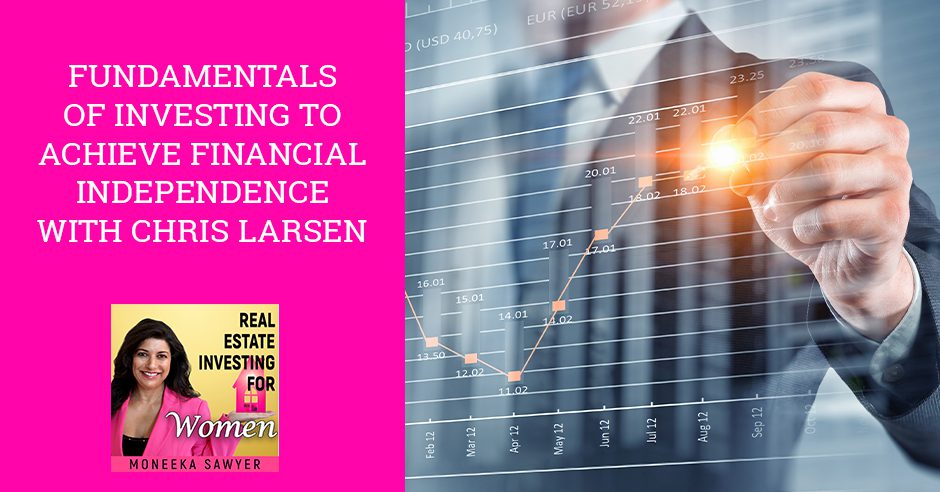
We have our own choices every day, especially in your funds. How do you handle your expenses, and what do you do to achieve financial independence? Join Moneeka Sawyer and the founder and Managing Partner of Next-Level Income, Chris Larsen, as they delve into controlling your cash flow, creating a structure that would enable you to grow as an individual and professional. Chris is passionate about helping investors attain success in their field. He enlightens people and shares a couple of his mistakes to take the fast track towards financial independence, which took him almost 20 years. In this episode, he talks about investing, infinite banking, loans, mortgage payments, tax strategies and more. Learn how to grow your portfolio, practice financial literacy and make the best choices in your professional life.
—
Watch the episode here
Listen to the podcast here
Fundamentals Of Investing To Achieve Financial Independence With Chris Larsen – Real Estate For Women
Real Estate Investing For Women
I am so excited to welcome to the show, Chris Larsen. Our guest is the Founder and Managing Partner of Next-Level Income. Chris has been investing and managing real estate for many years. While still a college student, he bought his first rental property at the age of 21. I love people that get into this industry young. Ladies, if you’re young, get in. From there, Chris expanded into development, private lending, buying distressed debt, as well as commercial offices and ultimately syndicating multifamily properties. He began syndicating deals in 2016 and has been actively involved in over $225 million of real estate acquisitions. Chris is passionate about helping investors become financially independent.
—
Chris, welcome to the show.
Moneeka, thank you so much for having me. I’m excited to be here.
I’ve been looking forward to this show. You’ve been patient with me with all the rescheduling. Thank you. I’m glad we’re finally here. Chris, give us a high level of your story. I know it’s very exciting.
First off, I love that you bring up, “Get started early,” now is early, whenever you can do it. I was 21. I was in college and to rewind a little bit, my passion at the time was racing bicycles. I went to Virginia Tech for Biomechanical Engineering. I did well in school and was told, “You should be an engineer like your grandfather.” All I want to do is race bicycles. Cycling is like a real engineer sport because it’s all about numbers and power to weight ratios. That was the end of my story in a lot of ways because I didn’t want to do that.
Along the way, at that same time, when I was at this turning point, trying to decide what to do as I was looking towards a professional career, my best friend, roommate, training partner passed away. He had a massive brain hemorrhage between my freshman and sophomore years in college. I poured another year into this sport. Then realized even after I was winning more and more races, I wasn’t happy. Even though my team went professional, I stepped away from the sport and went back to school. As a junior in college, I thought, “What am I going to do with my life?” I don’t want to be an engineer. I was going to go race and then figure out what I wanted to do.
While I was racing and even when I was young, the first thing I remember is I hop on my bike and I have this tremendous sense of freedom. Probably if you’re reading, you think the same thing. I wanted the freedom to live life on my own terms, not only to respect the life I was given but also the life of the friend that I lost. I turned towards investing. I was introduced to it by the same gentleman, Clint Provenza who introduced me to cycling. My father passed away when I was five and he was a real mentor to me.
I started looking into investing. I was day trading and one of those nights/mornings at 3:00 AM when I was lying there in bed, thinking about what I should do with my trades, I thought, “Do I want to be doing this twenty years from now?” The answer was no. I looked at other investments. I read over 250 books on money investing and settled on real estate because you could control it. I bought my first property at 21. I built and managed a portfolio of single-family rentals for fifteen years but ultimately transitioned into commercial real estate. That’s what we focus on now. I try to enlighten people and share my mistakes so they can take the fast track to get towards financial independence, which took me almost twenty years.
I have a very similar story that I wanted to be a dancer. That was my thing. I came to investing for a similar reason. I wanted a life of choice. I think that freedom of choice is our true wealth. That’s what I wanted and real estate allowed that. It takes me fifteen years before I could say that my husband and I could retire but I couldn’t do it with the lifestyle that I wanted in California. We would have had to move. We continue to grow our portfolio but it was at the same thing. After about fifteen years, I was like, “We are doing everything now that we’re doing because of choice and we want to do that.” There’s nothing more liberating than that.
I teach a Financial Literacy course for high school students. They’re coming out of underprivileged homes. Most of them are living below the poverty line. We had a conversation that at some point, income is important but it’s the freedom to choose. I cited in a study that shows the janitors that have freedom in their day-to-day choices are happier than the CEOs that are making 10,000 times than they are. They’re not happy because they don’t have freedom.
Don't be afraid to ask questions and understand the numbers, the strategy, and why an operator is going into the market. Share on XMy TED Talk is about this. There’s a lot of research where money does buy happiness to a certain threshold.
What’s that number?
The original number that came up within 2010 was 75, but a study that was done in January 2021 said 100,000. It’s gone up because of inflation, obviously. Basically up until then, the number of dollars that you bring into your household does relate directly to the level of happiness or satisfaction in the household. After that, we’re looking at we have freedom, excess income is taken care of and we can focus on joy or bliss. I’m glad we’re on the same wavelength around that. Talk to me about this concept of infinite banking. Tell me what you mean by that.
Next-Level Income was born of this desire to curate information around financial literacy and education. As I built it out, we have three main areas. We talk about how to make, keep and grow your money. Those are the three steps. I have coaching clients and that’s what we work through, “How can you maximize how much money you’re making? How can you keep more money?” That’s typically around entity structure, tax strategy but also this concept called Infinite Banking. If you think about what your biggest expenses are in life, most people know that taxes are one. If you are reading this, making a lot of money, you’re at those higher income levels like 20% or 30% in California, even 40% or 50% is not uncommon.
That’s a big expense but the next biggest expense that a lot of people don’t think about is financing. Think about how much money you spend on interest for your house or on cars and if you have a business, business loans, infrastructure, equipment. If I said to you, “What if you could take that financing dollars that you spent on interest, put them back in your own pocket and you could become the bank?” That’s what Nelson Nash talks about in this concept of becoming your own banker, which infinite banking was born of.
On average, when you pay a mortgage, it’s fully amortized, you pay a lot of interest in the front end, it goes down to so and so, and when you look at the very end, you were to finance out for 30 years, what amount of money relative to your principal do you end up paying? Isn’t that something crazy like three times as much?
It’s 2 to 3 times. Interest rates now are lower. It’s more like two times but historically, it’s about three times. Let’s not pretend you’re in California because you’re probably paying $3 million. Your average home in America is $300,000, so you’re probably paying somewhere between $600,000 to $1 million for that home. That doesn’t take into account when you refinance. A lot of people refinance. They reset the clock and you pay more interest. A lot of people never get out from under that.
Ladies, I want to give you a little clarity on that. What happens on a fully amortized loan is not what we call simple interest. A fully amortized loan means it’s heavy on the interest on the front end. Let’s say like 2/3 of your mortgage payment goes into interest, 1/3 might go into your principal and then it moves over your 30 years. At the end, you’re paying significantly more in principal. I don’t think it doesn’t exactly flip but you’re paying a lot more in principal and significantly less than interest. Every time you refinance, you start that clock on the heavy interest side.
In the past, ladies, I talked about I like interest-only loans. That’s because I don’t stay in homes very long. I refinance them to take money out so I can buy something else. I’m always high on the interest side. This is a way for me to control my cashflow and doing what I would normally be doing. When he’s going to talk about infinite banking, understand that you’re paying 2 to 3 times your principal. He’s talking about how you can put that to work for you rather than you paying that off.
That’s a great way. I co-hosted a radio show in college. One of the financial advisors advocated for a fifteen-year mortgage. I said, “No, you want 30-year. You want to have the money in your pocket and the ability to pay off your mortgage because, one, ask yourself, ‘What is your return on equity?’ It’s zero. The money’s sitting there. It’s not doing anything for you.” You can go out and use that money. You can finance, buy another property and leverage that. You can use the bank’s money to do that. If you have your home paid off, you have to pull that money out with the permission of the bank.

Financial Independence: Money buys happiness to a certain threshold. But then after that, we need to have freedom so we can focus on joy and bliss.
What’s interesting is whole life is very similar to owning a home. The term life insurance is very similar to renting. You build up equity in that policy but here’s the thing that’s great. When you have a properly structured life insurance policy and you build up that equity, you don’t have to ask anybody’s permission to take that money out. You own that policy. The collateral is your policy on your life. The insurance company has to lend you the money before it lends out to anyone else. They have to lend that money out to earn a rate of return because the other neat thing with life insurance, and this is unlike your home but similar, your home goes up in value. Life insurance does too because they pay dividends.
The insurance company invests that money. If they invest it well, what happens is they earn a return on that and give it back to the policyholders. This is important with this concept. You have to have the right insurance company that you’re working with and a properly structured policy. You can go buy the wrong mortgage for your home. There are multiple types of mortgages for your investment property. You have to make sure you buy the right policy with the right structures. Sometimes, there are multiple structures within that so it can be quite complex.
I was on the phone with one of my ladies and she was saying, “I’ve got something with State Farm.” I don’t know how State Farm is structured.
I do. I work for State Farm.
One of the other ladies that was on the same call with me said that she ended up trying the infinite banking structure. I don’t know how it all worked for her but over time, she wasn’t going to end up paying taxes on the money and was horrified. What I’m trying to say here is there are lots of different kinds of insurance companies and whole life structures depending on your goal. This is like with anything else, whether it’s investing, getting married or having a job. You have to know what your outcome is that you’re looking for. “Is it what is going to be paid to my family when I die? Can I use this money? Is it, I would rather not pay taxes or is it growth? What is it?” Once you make a decision, you have to find the policy that is structured to reach that goal in the best way possible.
You have to work. The unfortunate thing is there’s a limited number of companies that can do this. You want to optimize the company for your certain circumstance. If you are a 50-year-old woman, the company you might work with might be different than a 30-year-old man or 80-year-old woman. It depends on what your certain circumstance is. The other thing is if you work with an insurance agent that’s going to structure this policy, they’re paid less commission to structure the policies this way. When you maximize the cash value, you’re optimizing the insurance level. When you optimize that, it means you a lot of times lower it. You’re lowering the cost of insurance.
A big portion of that in the initial years is the commission. It’s paid to the agent. I’ve been in sales my whole life. I don’t think there’s anything wrong with paying somebody for the service you provide. That’s part of the thing. If you’re reading, you may have heard things like, “Life insurance is a bad investment.” I don’t call it an investment. I’ve used it for over several years now. This exact type of policy structure is like a super-charged savings account. It’s a tool that you can use along your investment journey. If you’re a small business owner and you say, “I own a small business,” what’s cool is you can also structure it for retirement. You can use it like a Roth IRA, but what’s nice is unlike a Roth or 529 plan for your kids, you have a lot more flexibility. You can use this money for whatever you want along the way.
The other thing that I love about these is that depending on how it’s structured. You were talking about different ages. If you’re 20 versus 80, you can put together a policy where you’re doing a monthly installation. You could also put together a policy where you have one installation. Your business did good and maybe you put $200,000 in, then you let that ride for a while. There are different ways to structure it. You don’t feel like in the old world where, “This was going to be a payment every single month and I don’t want another payment every single month.” Especially if you run your own business, you don’t know what next year is going to look like. These newer policies are interesting because there’s so much flexibility and new opportunity in structuring to create other ways of using them.
We have a whole page to it at NextLevelIncome.com. We have a banking page. You can check out some of the resources, videos, white papers there that talk more about this as well.
Income is important, but the freedom to choose is even more so. Share on XDo you feel complete on that topic? Did you want to move to the next one?
I’m good. I edited my book, added a chapter and didn’t mention it but that’s the other thing we have on the website. If you want to learn more about it, you can also get a copy of my book for free. If you go to NextLevelIncome.com, you can click on the Book link. I’ll send your audience a copy if they put their address in.
Thank you so much. Talk to me about your perspective on multifamily. This is a hot topic with my ladies.
I’m trying to figure it out. When you say that, I’m like, “How can I figure something else on my podcast that I can say, ‘My ladies.’” I don’t know if I’m ever going to figure that out or not, and that’s probably a good thing. I don’t think that’s not going to be my tagline. I call multifamily real estate the Holy Grail of investing. If you look at my book, it says, “How to Make, Keep, and Grow Your Money Using the Holy Grail of Real Estate to Achieve Financial Independence.” I’ll send you a copy for free if you go to the website.
I’m high on multifamily. I was the person that managed my own portfolio for fifteen years. I was a person that got a phone call on my honeymoon in Costa Rica and paid $40-some in collect call fees to deal with the problem tenant. I was the guy that stayed in too long and didn’t get a great return on my properties. I was fortunate enough to run into somebody that introduced me to this space. Several years ago, I started to investigate multifamily real estate. I’m a demographics guy. I spent eighteen years in the medical device industry. That’s how I made money to invest. I got into a medical device and moved to Asheville, North Carolina because we have great demographic trends.
When I started to investigate multifamily being an engineer, a day-to-day guy, analytical, I found that multifamily was supported by these terrific demographics by what we now call the Millennials. They’d rented, and guess who’s supporting multifamily now? It’s their parents, the Baby Boomers. They’re selling their homes. They’re renting. Gen Z is renting as well. We’ve turned into this nation that we like to own. That’s the American Dream but we also like flexibility. I jumped into multifamily. It was because of the demographics, analytics, my MBAs and portfolio management. What I found is something that Ray Dalio calls the Holy Grail of investing, which allows you to increase the Sharpe ratio. Don’t let your eyes glaze over. I’ll simplify the Sharpe ratio. It increases the returns of your portfolio and decreases the risk. It’s like a boat that goes faster and has less bumps when you’re on it. I thought, “What is better than that?” Ray Dalio calls that the Holy Grail of investing. I call multifamily the Holy Grail of real estate because it allows you to increase the returns in your portfolio and decrease the risk.
I know that in EXTRA, we’re going to talk a lot more about multifamily and a high level of why he loves multifamily much. We’re going to go deeper into the pros and cons of multifamily and then he’s going to do some number breakdowns for us. These are things that I get asked about a lot. It’s not my strong suit. My husband and I have not been involved yet in multifamily. The commercial evaluation of the numbers is not his strong suit. He hasn’t had to do it yet. This will be fun. Why don’t you give us a high level on why you like multifamily? What’s exciting about it?
There are a few things. If you’re reading and are like, “I love real estate but I don’t want to be the person that has to go in and fix toilets, find new tenants, screen people and do showings,” I get that because I’ve done it. The big thing is if you invest in multifamily with an experienced operator, somebody that is pretty good in details, it’s 100% passive. You can invest, be a direct owner, get the income and appreciation. The depreciation has great tax benefits, especially if you’re a high-income earner but you don’t have to deal with it all yourself. That’s fantastic. It’s scalable. You could buy a 100-unit multifamily building for $10 million or a $1 billion multifamily portfolio. Whether you’re investing in your first deal or for twenty years and you’re looking to place $1 million or $10 million of capital, you can use the same strategy.
It’s very scalable but there’s something that I like even more. It is control. You might’ve read me talk about laying in bed at 3:00 AM, feeling like things were out of control with my money. I like real estate because you can control it. We’re acquiring a property in Greenville, South Carolina. We live in Asheville, which is about one hour away. We were down in South Carolina for my son’s Lacrosse games and took them to the property. We drove around. It was built in 1997. It’s a little beat up in the stairs. Some need to be replaced and new paint. We can control all of those things. If you own a business, you get this. Apartments are valued like a business. They’re valued by net operating income.
If you live in your home or have a rental home, it’s 1,000 square feet and sells for $300 a square foot. It’s worth $300,000. The bank figures that out because they say, “The home on your left is worth $295 a square foot. Yours is about $300 a square foot.” You don’t control that. The market goes up and down. If we go and buy an apartment building for $10 million and have $1 million of net operating income, that’s probably not a great metric. Call it a $20 million apartment building with $1 million in net operating income. We increase the net operating income to 50% from $1 million with a $20 million valuation to $1.5 million with that new valuation. You’re probably thinking to yourself with your calculators, $30 million. We control that when we’re able to move the rents by the renovations, operations, more efficient and bringing in better management. It’s passive and scalable but most importantly, it’s controllable.
We’ll break down more of this in EXTRA so we can take it a little bit slower. Did you feel like you already covered what are the important metrics? What exactly should we be looking at?

Financial Independence: There are multiple types of mortgages on your investment property. You have to make sure you buy the right policy with the right structures.
We can unpack this a lot more in the EXTRA section. If you’re thinking, “This sounds interesting,” which I look out for as an investor. I started as an investor in these deals. I was what’s called a limited partner before I syndicated these deals and became a general partner. If you’re a limited partner and you say, “I’m interested in this,” you need to look at three different things. Number one, the Geography. Are you investing in an area of the country that people want to move to? I wrote a whole blog post about this. I talked about how you can identify these. It’s very easy to see with reports from companies like United Van Lines. You can go on our blog at the beginning of 2021 and read the post I put on there.
You want to be in large cities where people are moving that are growing faster than the national average. Where are these cities? A lot of these are from the Southeast. Remember I said, “I moved to North Carolina for the demographics,” the Carolinas, Florida, Georgia, Texas, Phoenix, Colorado, Boise, Idaho seems to be a big one here. Why are people moving here? They’re moving out of California to places like Colorado, Texas, Idaho. They’re moving to the Southeast from places like California, LA, New England, New York. Places that are cold don’t have a great quality of life. Taxes are going up. I have a coaching client that is like, “We’re looking at South Carolina to move. Taxes are going up. We don’t want to live here anymore.”
Number two, the operator. Are you working with an operator? This is somebody that’s going and finding the property that’s going to buy the property, bring you in alongside them, they’re going to operate it and increase that net operating income. Have they done it before? Have they done it in the Geography that you’re invested in and what is their experience there? You want to ask them some tough questions like what’s their strategy. You look then at the metrics in the deal. That’s complex. We looked at over two dozen different metrics on the deals that we’re in. There’s a lot of different variables that come into play.
If you’ve ever invested in a business, business owner or professional, you can read a financial statement. If you call me and say, “I’m interested in this deal.” As an owner of these properties, you’re entitled to all the same information you would be entitled to if you go into a single-family home. You can go through those, call the operator and say, “Walk me through this. What am I seeing here and there?” Don’t be afraid to ask those questions and understand the numbers, the strategy and why an operator is going into the market.
Talk to me a little bit about ROI. Different operators do this differently. Tell us about how you structure your deals for your investors?
What we do is called syndication. It is very simple. It is an operator going out and bringing in investors alongside them to invest. What’s important is how that syndication is structured. We do what’s called, typically, our preferred return. If you look at deals, 6% to 8%, what does that mean? That means investors get the first 6% to 8% of the returns coming from that property. Investors are preferred in front of anybody else. They’re going to be subordinate to the lender. The other thing that’s nice about these properties is it’s called nonrecourse debt.
I work with a lot of doctors after spending eighteen years in the medical device profession. They don’t want more risk, debt and a bank to come after them for something. They have patients that are out for them if something bad happens. That’s a nice thing about these properties as well. After the lender, the investors get that preferred return and then there’s an equity split. A large part goes to investors and then the partners that organize these deals get the minority position in there but that’s the incentive. You want to work with the group, in my opinion. How we do it is we give the investors the first big portion of the returns, about a half of the returns upfront and the other half comes from that split on the backside. We, as partners, get a piece of that split.
We’re incentivized to maximize the profit of that property on the backend. You asked a question there and I’ll address this. There’s typically a couple of different ways to look at this. You can look at a total return. You’re going to get a 10% return comprised of half cash and half appreciation on a property. There’s also an equity multiple. Another way to look at it is you’re going to double your money over a certain period of time. There’s also the IRR, the Internal Rate of Return. We can dive deeper into the EXTRA portion of the show or you can go ahead and check out my book, which goes deeper into this as well. You can always read on a site like Investopedia, which dives deeper too. It depends on what type of investor you are. Maybe cash or the total return is important to you and it all depends on what type of investor you are.
Do you pay investors immediately? When they first invest money, are they guaranteed a certain return each year while the project is happening or how do you structure that for your people?
One little red flag, we never say guaranteed because these are investments that have a risk associated with them. If you ever heard me say, “Guaranteed,” you should either slap me on the face or stick a paper towel or something in my mouth. We have a couple of different types of investments. We have investments that we pay investors a fixed return based upon the performance of the property. Our group typically pays out monthly. We like it. There are groups that payout quarterly. It’s not necessarily better or worse but personally, I like to get money in my account every month.
People who have freedom in their day-to-day choices are mostly happier than the CEOs making enormous amounts of money. Share on XYou get some stuff on the backend, depending on how the project goes.
Typically, in multifamily syndication, you’re going to get regular cashflow, monthly, quarterly or annually. Think about it as a rental property. You’re getting rent. If you’re renting it out for $1,000 a month and your expenses are $900, you might get $100 a month. When you sell it, if you bought a property for $100,000 and you sell it for $150,000, you get that $50,000 profit on the backend. It’s very similar to that.
Do you guys do the whole refinance structure piece too or you go for the sale?
When we model out the returns on our property, which is called a Proforma, we don’t assume we’re going to refinance the property. If you’ve ever owned a rental property or have a property of your own, what’s nice is if you have HELOC, Home Equity Line Of Credit, and you pull money out of your home or an investment property, you don’t pay taxes on that when you pull that money out. You might pay taxes when you sell it but you don’t typically pay taxes when you pull it out. It’s nice. It’s very similar to what we do. A lot of times, we look to do that if the property is performing. We don’t tell investors that’s part of the plan because we want to be a little bit more conservative than that. That is a very optimal way to pull investor capital out in a tax-efficient manner.
We dove pretty deep into all of that stuff and I know we’re going to get even deeper. Ladies, definitely stay tuned for EXTRA. We’ll be talking more about the fundamentals of multifamily investing, the numbers around that and why or why not to do it. Before we move towards the end of this show, Chris, could you tell everybody how they can reach you?
If you want to dive deeper and learn a little bit more, check us out at NextLevelIncome.com. We have a podcast, which hopefully we’ll be sharing Moneeka on in the future. We have a blog and you can also get our book for free, which dives deeper into all the different aspects that we talked about. Go to the website, click on the Book link, put your address in and I’ll even send you a copy for free.
Thank you for that. That was so generous. Chris, we have three Rapid-fire questions. Tell us one super tip on getting started investing in real estate.
The best tip I can think of is to find somebody that has gone down the path you want to go down, and either ask them for advice or hire them to help be a mentor.
What would you say is a strategy to be successful in real estate investing?
Success in general is habits. Whether you want to be successful in real estate, in life, losing weight or whatever it may be, you need to focus on your daily habits. If you want to be successful in real estate as far as syndications or passive investments, that may be reviewing a deal every day and every week. If you are going out and buying your own properties, that may be contacting brokers, making phone calls and getting options out there that are coming in towards you on a regular basis.
What would you say is one daily practice that you do that contributes to your personal success?

Financial Independence: When you maximize the cash value, you’re optimizing the insurance level. And when you optimize that, it means you’re lowering the cost of insurance.
I’ve learned a lot over the past few years. I bought my older son The Five-Minute Journal for Children and I use The Five-Minute Journal to meditate every morning. The Five-Minute Journal is basically a gratitude practice. I know you’re big on this. Happiness comes before success. You have to get in that right and abundance mindset, which is you share. You know that success or money will come to you and there’s always a deal out there. You don’t have to worry or fight over these things. Share, help other people, and other people will help you get in the right mindset. That’s what I try to do every day.
This has been an amazing show. Thank you so much for all you’ve already contributed, Chris. This has been great.
It’s my pleasure. Thank you so much for having me.
Ladies, stay tuned for EXTRA. We’re going to be talking more about the fundamentals of multifamily. If you are not subscribed but would like to be, please go to RealEstateInvestingForWomenExtra.com. You get the first seven days for free, so check it out. Download as much as you can and you can stay if it’s for you. For those of you that are leaving Chris and I, thank you so much for joining us for this portion of the show. We appreciate you. I look forward to seeing you next time. Until then, remember, goals without action are just dreams, so get out there, take action and create the life your heart deeply desires. I’ll see you soon. Bye.
Important Links
- Next-Level Income
- Book – Next-Level Income
- Blog Post – Where Should You Move? 5 Ways To Take Advantage Of “Geographic Arbitrage.”
- Investopedia
- Podcast – The Next-Level Income Show
- Blog – The Next-Level Income
- The Five-Minute Journal for Children
- The Five-Minute Journal
- RealEstateInvestingForWomenExtra.com
About Chris Larsen
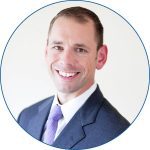 Christopher Larsen is the founder and Managing Partner of Next-Level Income. After 18 years in the medical device industry, he dedicates his time to helping others become financially independent through education and investment opportunities. Chris has been investing in and managing real estate for over 20 years.
Christopher Larsen is the founder and Managing Partner of Next-Level Income. After 18 years in the medical device industry, he dedicates his time to helping others become financially independent through education and investment opportunities. Chris has been investing in and managing real estate for over 20 years.
While completing his degree in Biomechanical Engineering and M.B.A. in Finance at Virginia Tech, he bought his first single-family rental at age 21. Chris expanded into development, private-lending, buying distressed debt as well as commercial office, and ultimately syndicating multifamily properties.
He began syndicating deals in 2016 and has been actively involved in over $350M of real estate acquisitions. In addition to real estate, Chris has invested in equities, oil & gas, and small business lending, as well as being active in Venture South, one of the nation’s Top 10 Angel Investing groups.
Chris lives with his wife and two boys in Asheville, NC where he loves spending time with them in the outdoors and enjoying the food and culture that the region has to offer.
Love the show? Subscribe, rate, review, and share!
Join the Real Estate Investing for Women Community today:
______________________________________
To listen to the EXTRA portion of this show go to RealEstateInvestingForWomenExtra.com
To see this program in video:
Search on Roku for Real Estate Investing 4 Women or go to this link: https://blissfulinvestor.com/biroku
On YouTube go to Real Estate Investing for Women
Moneeka Sawyer is often described as one of the most blissful people you will ever meet. She has been investing in Real Estate for over 20 years, so has been through all the different cycles of the market. Still, she has turned $10,000 into over $5,000,000, working only 5-10 hours per MONTH with very little stress.
While building her multi-million dollar business, she has traveled to over 55 countries, dances every single day, supports causes that are important to her, and spends lots of time with her husband of over 20 years.
She is the international best-selling author of the multiple award-winning books “Choose Bliss: The Power and Practice of Joy and Contentment” and “Real Estate Investing for Women: Expert Conversations to Increase Wealth and Happiness the Blissful Way.”
Moneeka has been featured on stages including Carnegie Hall and Nasdaq, radio, podcasts such as Achieve Your Goals with Hal Elrod, and TV stations including ABC, CBS, FOX, and the CW, impacting over 150 million people.
Growing Your Wealth With The Investor Mindset With Steven Pesavento – Real Estate For Women
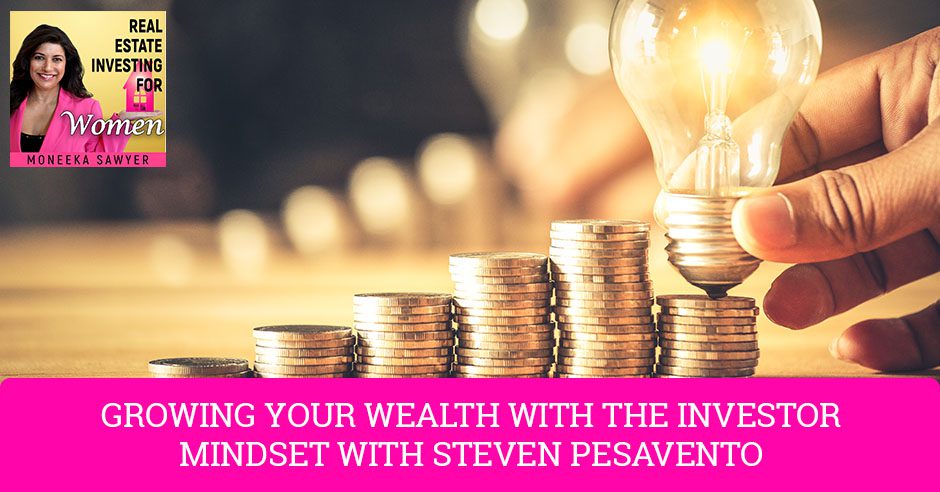
Surround yourself with people who align with your values. Moneeka Sawyer’s guest in this episode is Steven Pesavento, President of VonFinch and host of the Inventor Mindset Podcast. Steven talks with Moneeka about how he turned from failure at 27 to flipping 200 houses in less than three years. His secret? He changed his mindset from not valuing coaches, to going out of his way to connect with them. Be around mentors who’ve been where you want to go. With their guidance, you’ll skyrocket your way to unprecedented success. Tune in!
—
Watch the episode here
Listen to the podcast here
Growing Your Wealth With The Investor Mindset With Steven Pesavento
Real Estate Investing For Women
I am so excited to welcome to the show, Steven Pesavento. Steven is a real estate entrepreneur and expert relationship direct response marketer. He’s a Managing Partner of VonFinch Capital and investing full-time since 2016. He’s completed over 200 transactions, renovated nearly 100 houses, and transacted over $26 million in residential investment real estate. Steven’s investors have entrusted him with over $10 million of investor capital, delivering solid, consistent returns. Steven is the host of the top-rated show, The Investor Mindset and he interviews some of the smartest investing minds and authors like Chris Voss from Never Split The Difference, Jay Papasan from The ONE Thing and we had his wife on the show, which was amazing, then also Joe Fairless from Best Ever Podcast and many others.
—
Steven, welcome to the show.
I’m so excited to be here. I love your energy. That’s what energy everybody should be bringing to their life.
We talk a lot about this on the show and you are a mindset guy so we will cover this too but our attitude is everything in our businesses, our lives and for our bliss. Wouldn’t you agree?
I agree absolutely.
Surround yourself with mentors who’ve been where you want to be. Share on XYou’ve got this awesome story. I can’t wait to know about it where you went basically from a failure at 27 to 200 flips in less than three years. Could you tell us your story at a high level?
When I’ve got started in real estate, I had some of the same feelings a lot of you feel and almost every new operator has gone through this at some point. You have that desire. You want real estate to be your thing. You are excited about what it can do for you. The financial freedom bug has bitten you but there’s something that seemed to hold me back from taking action. I started my career back in management consulting and I thought that I had it all figured out.
I thought that if I go this traditional path, go to university, graduated from a great school and get a killer job, I was making more money than I ever could have imagined and making more money than my parents growing up. As a kid, we didn’t grow up with a lot. There was one subject in our house that always caused pain and that came down to money. Always the focus was, how I can create more? How can I make sure that I don’t ever have to feel those feelings? I’ve got into the career and it didn’t solve all the problems.
I had the money but I didn’t have the answers. I started going on this journey where I’ve finally got down, ready to get started in real estate and a lot of false starts but the beliefs were what was really holding me back. It was that belief that I didn’t have enough experience, the family connections, the money and know people with lots of money. All these things were a wall in front of me wanting to get started. I can remember when I finally made that decision to move forward and dive in. I was sitting on the couch of my girlfriend’s home at that time, jumping up and I said, “I’m doing this, not another day, not another minute. I am going to make real estate my career.” That day, I decided that I was going to push all in. That’s my mentality. It’s 100% once I decide something, it’s done.
From there forward, I was able to scale up to over 200 houses in about two and a half years flipping in two different states. Out-of-state, I was able to do this all by building great systems, hiring a great team and most importantly, getting surrounded by mentors who had already been down the path. I’ve got some stories that I can share about exactly how I went about doing that but that was the key to my success. I made a decision after I had got clear on what I wanted, and then I found a way to get surrounded by other people who had already done it.
I talk a lot about finding a mentor in this show. How did you find your mentors? There are a lot of people out there talking about this stuff.

Investor Mindset: Talk to somebody who can help you gain clarity so you know what to do next.
There are a lot of people who are real estate professionals. They maybe flip some houses, buying multifamily or some rentals. There are a lot of folks that you can look to but what you need to start and where I always advise all my clients, friends and audience. I’m the host of The Investor Mindset show. We dive into a lot of these types of conversations about thoughts and how those thoughts lead into action but it’s about figuring out what do you want first. What do you want and why is that important to you? It comes to the who and then once what that is, then you go and find somebody who already has been down that path and already done it.
For me, I found a local real estate investor event. It was the first action that I took. It was the same day that I made this decision. It’s what I recommend everyone else do. When they make a decision, they should immediately take some action. I committed myself to go to this event. One of the speakers happened to be a very well-experienced real estate flipper. I researched this person in depth. I listened to every show I could find. I tried to ask myself, “How could I be of value to this person? How could I make a difference in this person’s life? What skills, knowledge or frankly, the fact that I have time, how could I make an impact?” I thought of this plan, went to the event, listened, asked questions, engaged during the conversation, and then waited until everyone else had left and the conversations had died down, as all these people were going to go and talk to the speaker, that’s what often happens.
I made a pitch and my pitch was, “I will do this for you and build you this $10,000 to $15,000 website for free. All I’m asking is if I can be a part of your inner circle and if I might be able to follow you around at a property or ask you some questions from time to time.” Before I could even finish asking or making the offer, her hand was out in front, ready to shake it to lock it in it. It was because I found a way to be of value to her, to be able to help make her life easier and better. I thought to myself, “What are those skills that I could do?’
The reason that I went this route was that at that time, I had a lot more time than I did money. I had a lot of beliefs about coaching, training and spending money on these things. I didn’t know that that was only limiting my success. Fast forward, I ended up joining a Mastermind group that I was able to get surrounded by 50 other people who all had the same dream, many of who already were on that path and a few who already had that success. By being a part of that community, I was able to see the exact formula, the blueprint about how my business could look. That gave me the belief because I said, “If they can do it, then I can definitely do it.” I modeled my business that first year. We had flipped over 75 houses.
That’s another one of those things like there are a million masterminds. I probably get an invitation to a mastermind every single day. How did you pick the mastermind? Did you research everybody that was in it or what did you do?
The key to getting a part of a community is you have to one, it’s a little bit of luck but two, it’s mostly about showing up. I had committed myself to go to this event. It was the first conference that I have ever gone to. I ended up going to this conference and it was full of a ton of other people from the community who are also on that same path. There are many people who are friends of mine now because I met them at that first real estate conference. I had gone to many events and meetups. I had done plenty of free training but spending $1,000 to go to this conference for three days was a huge thing for me. Did I have the $1,000? No. Was I committed to going and finding even more people who I could get surrounded by? The answer is, absolutely.
Be clear on who you are, what’s important to you, and what you’re good at. Share on XBy getting into this community, I ended up going to the event. I did not join a mastermind and pay for any training as a result of going to that event. What I did was I’ve got connected to some amazing people. Through those amazing people, I ended up getting my mindset shifted on paying for coaching and mentorship. It was because of a business partner of mine that I, again, was trading my time to be able to do a bunch of services within his business to get access to some more training. Through that conversation, it ended up leading to a partnership and through his lessons, I ended up realizing the value of joining this mastermind. I thought, “I’m splitting with my partner. It seems like it’s a no-brainer,” and within about 24 hours of joining that group, I had already received enough value that directly led to paying for that whole $25,000 or $30,000 ticket price.
The lesson for me was, it was costing me money to be sitting on the sidelines and not taking action, not joining something. That’s not saying, “Go, fire off,” and buy any program but it’s about getting an experience with the people who are going to be a part of that program. It’s going to a webinar and training. It’s getting on a coaching call or strategy call with somebody who can talk through and help you gain clarity so that you know this is absolutely the direction I want to go. It seems like it’s a no-brainer for me to head down this path with you than to go but to try to go through the forest on my own without a map about exactly how I’m going to get where I need to go.
Steven, I love how incredibly concise you are, articulate and how you went boom. Thank you so much for that. I want to talk to you a little bit about this whole idea of building your business based on your clients. This is how I have always built my business so I love to know your perspective on what this is, first of all, because we all see things differently, how you have done it and advice around that.
It goes back to what we were talking about. I went from this place of this mindset and this belief that I can’t spend money on coaching. Otherwise, I’m a fool. I met people who had spent $30,000 or $40,000 on some program. I had thought to myself, “Those guys got hoodwinked.” I remember I can think of a couple of couples that I had met at the events and those people are complete idiots. Now, I realize that I’m an idiot but through that process and doing lots of coaching, mentorship, different programs and personal development, all these things, I ended up learning what was most important to me. I’ve got clear on who I was, what was important to me and what I was good at. Through that process of building my business, VonFinch flipping all of those properties, managing a team of fifteen people in two different states, and spending over $1 million in marketing in about a year and a half, I learned a lot about what I loved about the business and what I wasn’t in love with.
I came to this point where I thought to myself, “Is this the business that I want to be building for the next twenty years?” The answer was no. If you do the old rocking chair task or in this case, I better not be in a rocking chair at 50 but I was envisioning in this position in this place where I was going to keep running this house flipping business, this high-volume, a low-margin machine that was turning out deals and was making us great money. I realized this wasn’t where I wanted to be or what I wanted to be doing. Part of the reason was that the people that I was surrounded with weren’t in alignment with my values. I didn’t feel like I was serving on the level that I could and people weren’t open to these ideas that were so important to me.
I had been enlightened by the idea that mindset is the core of all success. When you can change your thoughts and beliefs, then you end up changing the actions you take and therefore, the outcomes that you experience in your life. Having this belief and realization, I wanted to share this with people around me. Fortunately, in my business, I was able to share that with my team, members of my mastermind community and certain clients but not all of them. As I looked at the flipping business, we are buying houses directly from homeowners, $0.60 to $0.70 on the dollar. We are doing that at volume and making a huge change in these people’s lives. We are changing their day-to-day. We are taking them out of a difficult situation and the majority of the people are absolutely thrilled but it wasn’t enough for me.

Investor Mindset: Repetition is the mother of skill and the father of learning.
What I ended up doing was I started searching for some answers. As I was sitting, after learning and being reminded about the importance of this idea of an ideal client, I started thinking through how I could change my business to start serving these clients. I came back and started taking some action because that’s what I do, making some shifts to start focusing on the investor first and making our business about serving them. I also realized there’s something that’s still in alignment. It’s not quite there.
After getting to this point where I had already made this decision that it was time for a change, I ended up stumbling upon the power of multifamily real estate and frankly, commercial investment. As I started getting more familiar with that, I saw a lot of the attributes of things that I like. The ability to scale, to have economies of scale that can happen by buying multiple units at one given time and the professionalism that is true within the industry. What ended up leading me to was this idea that this could be a great place for our business to grow into. What ended up doing it for me was that I knew that at the end of the day, I wanted to be surrounded and working with people who are like me, who were success-minded, successful, have been earning a great income and want to figure out how can they create freedom flexibility and the ability to be able to make an impact in the world. You can do that directly by investing.
If you can start getting the money that you are making from hours worked or from companies that you own working in real estate, you can start to see massive growth happen. For me, the reason why that was so critically important was that the people that I’m surrounded with are the people that I ended up becoming like. I wanted to make sure, I am surrounded by people who are working at a high level and I’m able to make a direct impact.
The second big piece for me was thinking about one-time sales versus long-term continuous relationships. I’m a guy who likes to move fast, talk and I sometimes can be curt from moment to moment but when people know me, they know that I’ve got a big heart, I’m here to support them and I do care about their success. By building these relationships, I knew that this is a business that I would be thrilled to be in for the long-term. That’s what ended up leading to the shift of deciding that this is the path we needed to go. We completely changed our business a few years ago to help be able to support and move in this direction.
When you look at your clients that you are building this business around, from my perspective, we have three different clients. We have the client that we are buying from and hopefully, you build a relationship with because many of these clients that may have several properties or maybe they want to let go of an entire portfolio. There are the people that you are buying from, you sell to and the people that you work with. What is your biggest focus or do you focus on all three? Your team is also they are your clients, too.
At the core, we are clear on what our values are and we value the idea of partnering with experts throughout everything we do. We hire, partner and bring experts internally onto our team because we know that everyone has a unique ability. It’s something that they are amazing at. It’s their superpower. I know mine. You know yours. Our team members each know theirs. By being able to partner with experts, we can leverage what we are good at while leveraging a track record of years of experience in the business so that we have been able to scale quickly to be able to make a direct impact without necessarily having to go and do everything ourselves.
Hire and partner with experts. Share on XWe believe that we are putting our clients as well as our business, which is built upon our team, in a much better place by doing this because sometimes people get stuck in this idea that I need to get everything for myself. We are not like that. We truly believe that it’s all about when we do better, we all do better. We want to make sure that our limited partners and our investors are supported that they are going to do great in these deals. We want to make sure that our operating team on the ground is going to be well-supported and their experiences are going to help support all of us to be able to go out and do the things that matter most. In our real estate business, that’s our key focus. We know that we’ve got operators, people that we are purchasing deals from on the ground and investors. Throughout that experience, there’s a track record of who we are, how we show up, what’s important to us and all of those things end up coming true. Over time, we have developed into having a reputation that stands for exactly what I have been describing.
I love the way that you talk about your operators being in their genius zone. I’m doing a construction project and we have these balconies. We’ve got all this rod iron stuff and it was hideous. I walked upstairs to look at it up close and I was like, “This is horrible.” My contractors came out and they were like, “We agree with you.” I was like, “Thank goodness.” They worked hard to find this for me. We are looking for something different and one of the things that I have noticed is that I love working with exceptional people. He is an exceptional contractor. He makes my life and my business so much better. That’s so true that who we work with, those vendors and operators, all of those people are such a key piece to running a business that’s aligned with our values, that feels good and is sustainable over time. Thank you so much for mentioning that.
It has made such a big difference. We have clients on our investor side who, from time to time, will ask, “Why don’t you operate directly? You are in the market and have a good understanding, why don’t you put the team in place?” It’s asset management. It’s this and it’s that. The answer is, “You are absolutely right. We definitely could. We can hire internally and bring on people that are on a payroll that means that we get to make more money. The thought is that if we were to do that, we would be going against what we believe in, and then second, that we truly do believe that by going and partnering with somebody who is in their genius zone, their unique ability that’s good and has that track record, we are setting ourselves up to make a lot more money as a result.” Rather than doing the things that we don’t like doing, don’t fill us up and aren’t our unique ability than we are taking away from time that could be spent growing, making an impact and difference.
This conversation has been awesome. Tell everybody how they can reach you.
The best place to reach us is, if you have liked the conversation we have had, I encourage you to go subscribe to The Investor Mindset Podcast. If you liked what we talk about, we talk about this twice a week on the show. If you feel like this has been valuable and you enjoy the mindset stuff that I encourage you, we put together a great free resource at TheInvestorMindset.com/success where we are diving into the Top 5 Success Principles of a Successful Investor and lessons that have been learned over hundreds of interviews with some very impressive people. You can grab a copy of that. If you read and like what we are talking about, you can hit me up on any of the social media platforms, shoot a little DM over, let me know that you read about this show and I would love to connect with you.
Thank you so much for that. I love free gifts, too. That sounds amazing. It was a 5 Principles of Success of a Successful Investor, right?

Investor Mindset: Meditation is a great way to catch ourselves when we have a set of beliefs that aren’t serving us.
Yes, that’s exactly it.
Thank you for that. Steven, are you ready for three rapid-fire questions?
Let’s do it.
Give us one super tip on getting started investing in real estate.
The most important tip when you are getting started real estate investing is to get clear on what you want, why you want it and then figure out who is going to help you get there. The reason why I have repeated this three times is that repetition is the mother of skill and the father of learning. If you are going to do this and you haven’t done it already, I encourage you to sit down and get clear on what is that thing that you want? What does life look like on the other side?
Once you get that clear, it’s almost a foregone conclusion that you are going to take the action to get there because you are going to be able to feel it. Sometimes people want that freedom, flexibility and independence but they don’t take this time upfront getting clear, and then you will end up where I was, where you built a successful business and made a huge impact, and then where you would say, “It’s time to pivot.” Even though I was clear on what I want, it wasn’t what I was going after. You might be able to save time by going directly to go rather than around the way. It’s just the way things go.
Maximize your time growing and making an impact. Share on XThat’s very aligned with how I teach people, too. Always start with you, build around the business around the truth of who you are and where you are headed. Talk to us a little bit about a strategy on how to be a successful real estate investor.
It starts with the exact same thing but when it comes down to investing, you want to be in a position where once you know those two things, then it’s time to take action and figure out who you are going to partner with, work with and help support you within your business. That might be employees, coaches, masterminds and training. Whatever those things are for you, you’ve got to get clear on who’s going to help get you there. That might mean going out to your network and saying, “This is what I’m doing and what I want to accomplish. Would you happen to know anyone who might be able to give me a lead or make a connection?” By going directly to people who already know, like and trust you that are in the space, they will be able to connect you to someone else and so on. It’s that power of your network that when you combine getting super crystal clear with going out and building phenomenal relationships and you bring those two pieces together, you will be in a strong position to not only scale but to do it in the right way.
What would you say is one daily practice you do personally that contributes to your success?
There’s a set of practices that I consider my one practice. Every single day I wake up with a movement, meditation, mapping and mindset. What I mean by that is I get up and I move for at least ten minutes. It’s often quite long but I will go for a great run. I get that blood flowing and I start to get my brain in a place where I’m ready to step into my day. I’m a lot smarter when I’m moving so will you? I encourage you all to do that. Meditation is a great way to slow down, especially if you are a driver type A person like me but even if you are not, we can start to see our thoughts and be able to catch ourselves when we are thinking something or we have a set of beliefs that aren’t serving us at that moment. I listen to some mindset. I love reading obviously great shows like the one you are reading, as well as other content that’s going to help enrich my brain and start putting me in the right state of mind for the day. Finally, I always start my day with a map with a very specific plan of what actions I’m going to take and what’s most important for me that day. When I do all four of these things, I end up operating and frankly, working from a much happier place.
How long does that whole process take for you normally?
It could take as little as 30 minutes or as long as an hour or hour and a half. It depends on the day but by committing just 5 minutes of breathing, 10 minutes of running, a quick 5-minute process of mapping out the day and while you are running, you can throw on a little something to motivate you to put in some of those thoughts and beliefs that you know are important. You can put that altogether or you can separate it out depending on what works best for you on each given day.

Investor Mindset: Every time you go listen to the investor mindset, take action on it.
That’s so actionable. This has been awesome, Steven. Thank you for everything that you have offered in this portion of the show.
It has been amazing being here and the biggest thing that I want you to take away from this is that in every single conversation, everything that you listen to, every time you read about the show, listen to The Investor Mindset, read a book, go to a conference or open up some course that you are diving into, there is always something that you can take away but the most important thing is that you take some action on it. Decide what’s one thing from this episode that you can do, who is one person you can reach out to, and what’s one show you can follow that’s going to end up setting you up to be in a much better place. I encourage you to figure out what that is and take that action. I look forward to being able to serve you in the future.
Ladies, you can do that. I love the way Steven does that. I made a decision and that day, I met this person. Most of us don’t act that quickly on decisions that we make. One of the biggest determining factors for success is our ability to make quick good decisions. That means you have to be aligned and intuitive about what feels right, what feels wrong and what’s settling with your gut but you have to be able to make decisions fast and take action on them. That’s a huge characteristic of successful people. Thank you so much for highlighting that.
When you hear the story of me taking action, immediately deciding, and a week later being at an event and a few days later, having a mentor and a year later having 75 flips under my belt was that it took me ten years to get to the point of making that decision. It took a long time. I read Rich Dad Poor Dad when I was 17 and I was 27 by the time that I had bought my first property as an investment. It goes to show that in that moment I decided and everything great happened from there. Why wait ten years? Why not decide now?
We do have more in EXTRA. We are going to be talking about scaling a business remotely. Ladies, you know that for me, freedom of choice and freedom of time are the biggest things that I strive for. That’s how I define blessed. I want to be able to travel. I want to be able to spend time with my aging parents. Time is my thing. Systems, processes and your team allow you to create that freedom. Since Steven is an expert in this, I asked him to please share with us how he’s done it so we are going to be doing that in EXTRA. Definitely stay tuned for EXTRA for that. It’s going to be awesome. If you are not subscribed to EXTRA, you should get subscribed for this one.
Go to RealEstateInvestingForWomenExtra.com. The first seven days are free so you can try it out. Get this EXTRA and as many as you can download. If you love it, you stay and if you don’t, no obligation but check it out. For those of you that are leaving us now, thank you so much for joining Steven and me for this portion of the show. I look forward to seeing you next time and until then, always remember goals without action are just dreams so get out there, take action and create the life your heart deeply desires. I will see you soon. Bye.
Important links
- VonFinch Capital
- The Investor Mindset
- Chris Voss – The Investor Mindset Past Episode
- Never Split The Difference
- Jay Papasan – The Investor Mindset Past Episode
- The ONE Thing
- Best Ever Podcast
- Joe Fairless – The Investor Mindset Past Episode
- Rich Dad Poor Dad
- TheInvestorMindset.com/success
About Steven Pesavento
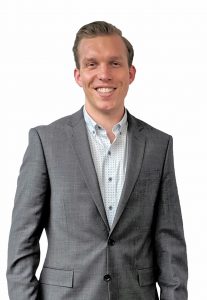 Steven Pesavento is a real estate entrepreneur and Managing Partner of VonFinch Capital. Investing full time since 2016, he’s completed over 200 transactions, renovated nearly 100 houses and transacted over $26,000,000 in residential investment real estate. Steven’s investors have entrusted him with over $11 million of investor capital, delivering solid consistent returns.
Steven Pesavento is a real estate entrepreneur and Managing Partner of VonFinch Capital. Investing full time since 2016, he’s completed over 200 transactions, renovated nearly 100 houses and transacted over $26,000,000 in residential investment real estate. Steven’s investors have entrusted him with over $11 million of investor capital, delivering solid consistent returns.
A former Management Consultant for some of the Fortune 500’s top companies, he brings his years of process improvement, marketing and sales experiences to every project. Steven graduated with honors from prestigious St. John’s University in 2011 and is active in multiple charities including working with youth teaching business with Junior Achievement.
Host of the top ranked podcast the Investor Mindset he interviews some of the smartest minds & authors like Chris Voss – Never Split The Difference, Jay Papasan – One Thing, Joe Fairless – Best Ever Podcast, Mark Manson – Subtle Art of Not Giving A F&#k and many others.
Moneeka Sawyer is often described as one of the most blissful people you will ever meet. She has been investing in Real Estate for over 20 years, so has been through all the different cycles of the market. Still, she has turned $10,000 into over $5,000,000, working only 5-10 hours per MONTH with very little stress.
While building her multi-million dollar business, she has traveled to over 55 countries, dances every single day, supports causes that are important to her, and spends lots of time with her husband of over 20 years.
She is the international best-selling author of the multiple award-winning books “Choose Bliss: The Power and Practice of Joy and Contentment” and “Real Estate Investing for Women: Expert Conversations to Increase Wealth and Happiness the Blissful Way.”
Moneeka has been featured on stages including Carnegie Hall and Nasdaq, radio, podcasts such as Achieve Your Goals with Hal Elrod, and TV stations including ABC, CBS, FOX, and the CW, impacting over 150 million people.
How 30% More Courage Can Double Your Revenue And Your Happiness With David Wood – Real Estate For Women
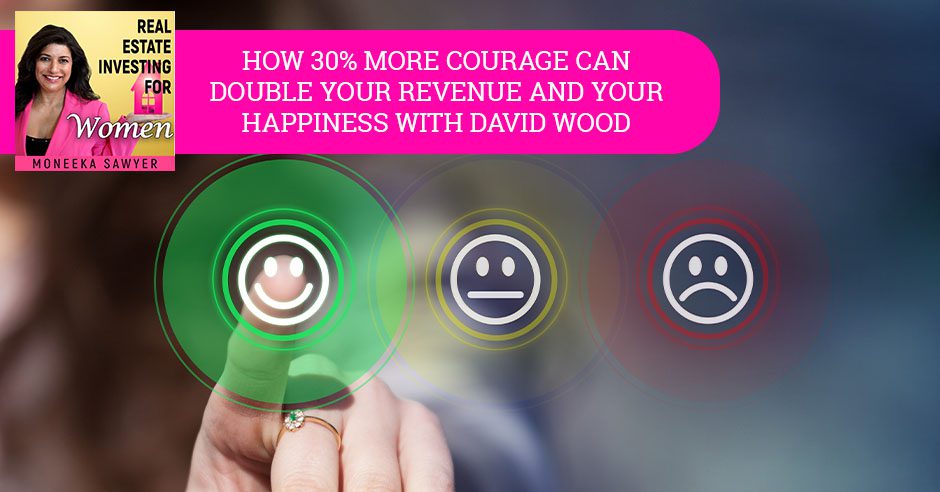
When do we muster more courage to focus on what we really need and want in life? Join Moneeka Sawyer and David Wood of Focus CEO as they delve into staying focused on your goals and staying on track so you could achieve your personal and professional happiness. David shares how he discovered personal growth and why he’s an absolute advocate for the truth. We learn how important it is to stay committed to growth, self-expression, and emotional freedom because the world is changing and we need to adapt in order to stay on the path. If you need a boost up in your courage and confidence in facing life’s challenges, then this show is perfect for you.
—
Watch the episode here
Listen to the podcast here
How 30% More Courage Can Double Your Revenue And Your Happiness With David Wood – Real Estate For Women
Real Estate Investing For Women
I am excited to welcome to the show, David Wood. He quit his career as a consulting actuary to Fortune 100 companies to create the world’s largest coaching business. He now coaches rockstar entrepreneurs to double their revenue faster, overcome shiny object syndrome and be more extraordinary entrepreneurs and humans. David, welcome to the show.
Thanks, Moneeka. I’m glad to be here. I like how you grounded yourself before we started this interview. It gave me a chance to take a breath, drop in, feel into my body and maybe even a little beyond. I’ve done 160 interviews and I haven’t seen a host do that. I’m appreciating that about you.
There’s no possibility for perfection. There’s evolution and you learn every step of the way. Share on XThank you so much. That’s such a great way to dive into your topic too. When you’re doing something and you want to be extraordinary at something, I can’t say I am extraordinary but that’s certainly my goal, you want to make sure that you can focus, that you’re grounded and present in every moment, breathe, thought and piece of the conversation, don’t you think?
That’s the goal and the ideal. I’m not always there but how present can I be? Sometimes mid-sentence, I realized I stopped breathing. I could take a breath because it’s easy to get amped up when I get excited about things. It’s a constant journey. Get excited and amped out, but can you also stay grounded at the same time.
It’s a skill and thank you for recognizing that. I want to know a two-minute version of your story of how you became the guy that you are now and doing what you’re doing.
I didn’t realize this was the story until I started podcasting and answering questions. When I was very young, I had a tragedy in my family. My little sister was killed when I was seven and I was there. I witnessed the accident. I didn’t know until years later that I had switched off a large part of myself. Now the benefit was I got good at schoolwork, left-brain stuff, numbers, money and systems. I came top of my school. I got paid to go to university then I landed a job at a corporate consulting firm on Park Avenue in New York. I’m like, “This is rocking and I’ve got it made.”
I discovered when I found out about self-help, which I was very reluctant to go to and I’m like, “These people all wear name tags. They’re smiling way too much.” When I went and did it they cracked my heart open and I realized I had a lot to learn about intimacy, vulnerability, communication, leadership and influence. I knew nothing about those things. I’m an unusual coach. I’m good with the number systems and money but that’s not my main priority. I’ll help you with that. Let’s make more money but I care about how you show up in the world. How’s your courage, truth-telling and self-expression? I want everyone to be able to die with zero regrets knowing they gave it everything they can.
I live in Silicon Valley. I am surrounded by brainiacs everywhere. They live in their minds. They’re all about the numbers. They’re software programmers and changing the world with what they create but they’re not connected to themselves. Often, they’re not connected to each other or to their partners. They’re connected enough. We see this in different pockets where we all live. We see societal expectations form the communities and the way our relationships work but they’re not as much into self-help usually. To watch you and have someone on the show that’s gone from that similar mindset as your mindset, heartset and connection make such a big difference in your success. It’s lovely to have someone on the show who’s made that transition.
I’d call it making that transition because I’m a work in progress. I’m not perfect by any means. I’ve lots of flaws, vices, crutches and all sorts of things. Hopefully, one of the differences between me and the average bear is I’m watching a little closer. For example, there was a shooting in my local supermarket in Boulder, Colorado. I was having my reaction and then I’m watching the reaction. My initial reaction was one of fear and like, “Maybe I should leave the US.” This was my safe bubble and my safe bubble is getting smaller all the time. As I kept watching it, I’m like, “Is that the reaction that you want to have?”
I started having a little compassion for the shooter. It’s not a lot of compassion but a little bit like, “How unhappy would someone have to be to go and start shooting in a supermarket?” I started feeling compassion for the people who were injured, then all of the people which includes a lot of the world right now who might be feeling fear at that. Someone else got shot. It wasn’t me but we still feel fear. I’m a constant work in progress. My work is never done. If I ever get to that point, I’ll probably be dead.
Thank you for that vulnerability because that’s true of anybody who’s deep into the path of evolution, that developing our mindset, our heartset and the people that we want to be and how we show up in the world. That’s a constant evolution. As you say, it only stops when you die. How long are you able to actively engage and becoming your very best self? That’s what you decide. You will continually evolve until you die but you decide how long you completely engage. I love when you talk about it in such a vulnerable way that, “I’ve got so far to go.” I say the same thing. There’s no possibility for perfection. There’s just evolution. Thank you for sharing that.
It’s funny that I present a great image when I’m speaking and it can sound like I’ve got everything together. I’ve learned a lot. It’s great and I’m happy to share that but I want to be transparent and say that there’s another side. You guys should hear me swear when I’m playing a video game when it’s not going well. I even get annoyed. I could be playing with some fifteen-year-old in Sweden. They quit with not even a good game and I still get annoyed. I’m like, “Where are your parents? Why aren’t they teaching you how to shake hands properly?” You still got lots of judgments. I’m taking it on as a challenge like, “Can I have my heart open even while I’m trying to win, crush and dominate? Can I be giving if someone quits and disappears?” I’ll go and chase them up and say, “You played a good game.” I got plenty of flaws. Don’t worry about that.
You talk so much about truth. What do you think it’s so hard for people to talk about that naturally? Why do you think it’s important?
As a kid, I know I wasn’t always rewarded for telling the truth. You get in trouble and there’s a definite hierarchy in most parental situations where the parent has all the power. I learned and a lot of people learned how to tell lies. I heard a developmental expert say, “Don’t get upset when your kid tells a lie. It’s an important part of their evolution that they learned to fabricate something.” I was like, “I hadn’t thought of it that way.” That was my life. I haven’t spoken about this in a show. My parents are good people with integrity. It’s not like they lie or go out of their way to rip someone off.
My mother is 78 and my dad is 83. They’re selling the caravan which is a big deal because I guess they’re no longer going to go caravanning. I’m not sure how I feel about that. She said, “This guy drove from Sydney in the rain for two hours to check out the caravan.” He’s deaf, can’t speak, uses sign language and he said, “He sent the money via his app.” The money hadn’t arrived and my mother said she didn’t have the heart to send him back to Sydney and have him do another drive to come and get the caravan when the money arrives. She let him take the caravan. She’s like, “I’m just going to trust him that the money’s going to come.” It’s an $8,000 caravan.” I have a lot of respect for my parents’ integrity. If my mother could ever steal money from someone else, then she wouldn’t trust this guy. She couldn’t even imagine that someone could not follow through with the money.

When it comes to business, ideas are endless and entrepreneurs can see all the opportunities.
They have that and yet a lot was hidden as I grew up. Maybe you don’t say something because it’s going to be awkward. You don’t say that because it is going to get you in trouble or you tell a white lie. That’s very common. Fortunately for me, I discovered personal growth and I had some good coaches who were showing me another way of being. They showed me what it’s like to have pristine integrity and to have those tough conversations. I had to make a list of all the people that I had anything less than full love for. It’s people I resented, hated and felt guilty about how I treated them right throughout my entire life. They’re like, “Now go and call those people and complete.” I said, “No, you’re kidding. I’m not going to call that bully from high school and tell him I’ve hated him for twenty years and I’m letting it go. I’m not going to call that girl who dumped me twice and gave me the cold shoulder. I’m not going to call that boss who I sued and see if we’re good now.” They helped me dive into why I didn’t want to do it, all the fears I had around it, and then they showed me a way to go and do it.
Those calls were incredible. I was terrified but when I got on the phone with these human beings and spoke my truth and was connected with a slightly open heart, these people surprised me over and over again. The bully said, “What can I do now to help you or us move forward?” The girl who dumped me twice, I said, “I don’t need an apology. You don’t have to do anything. Just listen.” She said, “I’m so sorry. I was young and stupid. I’m sorry for how I treated you.” I’m in tears. The boss that I sued. I said, “I want to check if we’re good. Is there anything I can do?” He said, “At the time, I’m sure I didn’t enjoy it but that’s water under the bridge,” and then we got talking about his life. We never had a personal conversation. Now he’s sharing about his divorce and what it was like going through that. I’m an advocate and evangelist for truth, not all the time and I’m happy to get into that. If you’re willing to model courage, take a risk, reach out, connect and share your truth with another human, 9 times out of 10, I found you’ll be happy that you did it.
I’ve done an interesting thing that’s pretty similar to what you talked about, but I didn’t have the conversations with the people. Some of it is because I don’t have access to them. For me, I did it a lot for my own closure. What happened for me also is that moving forward, I made sure that I don’t miss the opportunity for truth or honesty. Maybe I don’t go back, although I can see how incredibly healing that would be to get that all out, but it also sets the groundwork for what we do in the future. The past doesn’t determine who we are or who we’re going to become. It’s who we decide to be now that decides who we’re going to become. Doing that exercise even internally to make the decision to not miss opportunities for truth is also a possible good benefit. It’s shown up well in my life. I have never recommended going back to those people but I did the exercise for myself so that in the future, I would remain open to capture any opportunities for truth. Do you feel like that’s valuable or do you recommend people to go deep and talk to all the people?
Let’s take a situation. Some people say should you say anything, should you not. I know a guy who had the three-times rule. If it comes up in your brain three times, it’s time to say something about it. Your question is a good one. What if it’s something from the past? It depends on how committed you are to growth, self-expression and emotional freedom. If it’s a minor thing and you haven’t thought about it in twenty years, maybe you don’t care. If it’s something you have thought about more often than that, it might be something unresolved for you.
Stay focused and stay on track because there will always be disruptions and changes in your life but you have to keep yourself together. Share on XI do believe it’s possible to get some healing and completion by writing a letter and you don’t even have to mail it. You can mail it to yourself. This is particularly important if someone has died and you cannot speak to them physically. You can have a role-play conversation with them with your coach or you can write a letter. I’m a big fan of that. In fact, I had someone in prison. I was coaching them on reconciling with their mother. They were so scared to have a relationship. I said, “Write a letter and then it’s up to you if you want to mail it. You may not get the result you want but it’s up to you if you want to take that extra risk.”
Having gone through this myself and had those scary conversations with people from my past, I am a massive fan of that. It takes courage so you get to exercise that muscle of courage. You don’t know what impact that conversation is going to have on the other person. My brother did this with an ex-partner. He wasn’t going to call her. He’s like, “It’s weird. I’ve moved on. She’s moved on.” His coach said, “You’d be surprised. Just have the call,” and so he did. He said, “I want you to know it wasn’t you. It was me. You were wonderful. I just didn’t want to be in a relationship at that time.” She broke down crying. She’d been carrying that around for years thinking there was something wrong with her. This was a guy who had no money at the time. He said, “That conversation was worth $10,000 to me and the difference I made in her life.” I’m a big fan of doing it.
There’s a way to do it well and badly. If you go in with, “You wronged me. I’m a victim and I need you to apologize,” that might work but you’re setting yourself up for a tough time. If you can get to a space where you don’t need anything from the other person other than listening, it’s going to go better. I have a model for this called the CARE and I’m happy to give it away to readers. I’ll tell them how to find that. It’s a wonderful download. It’ll give you clarity. You don’t even have to decide if you’re going to have a conversation with a person. Just fill in the worksheet and get the clarity. After that, you’ll know if you want to go and have it with them. It will give you a wonderful paint-by-number system to have the conversation.
This conversation could go so much deeper than we’ve got time for. I think that there’s also the whole conversation of abuse. Do you go back to people that have done that? The CARE Model might help work through whether it’s a good idea or not in that circumstance.
It’s wonderful. Initially, you’ve got this feeling of like, “I don’t like that person. I wouldn’t like to see them on the street. I’m annoyed at that person. That person is a jerk. That’s all you’ve got.” When you do the worksheet in the CARE Model, you will get clear on what your intention is. What’s the positive intention if you were going to have the conversation and what are you afraid of? That’s good information. “I’m afraid they’re going to think I’m an idiot, it’s going to make things worse or I’ll feel awkward.” Just get clear. The clarity is wonderful. It’ll ask you, “What could go wrong?” There’s a checkbox, “I am willing to accept these consequences.” If you’re willing to check that box, you’re good. If you’re not willing to check the box, for example, if I have had a conversation where I confessed to a crime. I called someone and I said, “It was me. When I was a teenager, I did this thing. I’m very sorry. How can I make it right?” I could have gone to jail. You may not be willing to accept that consequence and I respect that.
I confessed when I was eighteen, I did one of the worst things in my life. I cheated on my partner and I felt so bad about it. If I was filling in the worksheet, “What could go wrong?” She’ll break up with me and never go back with me again. I checked the box. I’m willing to accept that consequence because my intention is to have a relationship full of integrity and trust. I’m going to risk everything to have that and so I did. I went and had that conversation. She did break up with me. I had to earn her trust back and we ended up getting married. While we’re no longer married, I went and stayed a couple of years ago with her, her new husband and a six-year-old boy who calls me uncle David. I’m a big fan of telling the truth. I’m a big fan of not cheating in the first place, but if you have been dumb enough to go and make a mistake like that, I personally am a fan of making it right and risking the relationship. You may choose not to. You’re like, “No, I’m not willing to risk that,” so that’s not a conversation you would have unless I’m your coach. If I’m your coach, you’re going to be hard-pressed to get away with not making things like that right because I know what’s available when you do.
Could you talk a little bit about the monkey mind? One of the things that I find on this show is that about 50% of the time I’ve got a new strategy. Someone has come up with a new product or strategy. I always tell people, “There are a million ways to make $1 million in real estate but you do have to pick one.” What that means is that you can’t consistently and constantly engage with this shiny object syndrome. It takes focused action. Could you talk a little bit about that shiny object syndrome and how to move away from that to having a peaceful and focused mind so you can take focused action?
The question is, is the human mind like a monkey on crack? Is it important to overcome shiny object syndrome and focus? It depends if you want to be coursed in your life. I mean that. I’m not setting this up. One way to enjoy life is to surrender and be with the flow, wake up, check email, check voicemail, and do what feels natural. That’s a valid way to operate. Some of the teachers that I followed speak a lot about, “Don’t do. Just be.” There are times to do that. However, another game that’s great to play in life is being coursed in the matter. Being coursed in how your relationships go, your own health and energy, how your job goes in your career path or how much money your business makes and how many people you impact. I’m a fan of that game a lot of the time. That’s where coaching comes in for me.
As human beings, I do believe the human mind has become like a monkey on crack. If you disagree with me, sit down and set the timer for five minutes, close your eyes and count your breaths. See how many breaths you get to before you’ve drifted away. The mind has taken over. It’s thinking about your socks, what you want to order on Amazon, some business problem or someone who insulted you. When it comes to your own business, it’s even worse because entrepreneurs can see all the opportunities. We see all the target markets. We want to help and all the problems that we want to solve, all solutions that we can come up with, and all the traffic sources we’re going to try and use. It’s overwhelming.

Entrepreneurs never stop providing solutions to problems and crafting the sources they would use.
If you’re happy to surrender or if entertainment is your goal, keep doing that. I mean it. It can be fun. I’ve got days where I do that. Let’s say you’ve got a goal that you want to double revenue in the next twelve months, that goal matters to you. Maybe you want to double your time off so you’ve got more time to spend with your kids, write that book, go swimming with dolphins, volunteer in prisons or whatever it is, then it starts to matter. We need to focus so that we can be on course. If you don’t do it, you will be at the effect of life. You’ll be bounced around with other people’s agendas. Check the email in the morning and you’ll see exactly what I’m talking about. You’re working on other people’s agendas. I caught myself checking through for important emails. That’s so difficult then I found one and it required me to go to a website and enter something to unsubscribe. I’m like, “David, step away from the task. Let’s get back to being on course.”
I have some recommendations. I’ll give you a few tips to help you focus, then at the end of the show, I’ll give you a cheat sheet that’s got the full checklist. Firstly, you’ve got to know where you’re heading. Twelve months from now, what are the goals that would have you do the happy dance should you achieve them? If you and I were talking twelve months from now, looking back, celebrating and you’re dancing your ass off, what would those goals be? Three big ones. You can have lots of little ones but those should go in the drawer for when you’ve achieved the others. I had a client, “I’ve got twenty goals. Is that too many?” I’m like, “Yes. Have three goals that matter and put the rest in a drawer. You’ll pull them out when the others are done.” That’s tip one.
Tip two, you’ve got to layer the goals because a year out is way too long. It’s pie in the sky. It doesn’t mean anything. Bring it back and have the three-month version, then you need the seven-day version and what are you going to do tomorrow? Tip three, that’ll set you up for now but what about next week or next week after? It’s super important to have a date with yourself once a week for twenty minutes where you look at what you did and celebrate. That’s all I’m asking for. You can pat yourself on the back and say, “Good job.” I sometimes do something and I say, “David, you’re a legend. Great job for doing that. We need that because you probably did ten times more than you think you did.” The next part of that date is you look at your three-month goals and choose what you’ll do for the next seven days, “This is what I will care about.” Those are three important tips.
How do you stay on track with that? Let’s suppose you do it. A lot of people put it in their calendar and they don’t even show up for that date with themselves. I can’t make you do that. That’s where discipline comes in. I set it up for a while where if I did not create my weekly action plan by 1:00, Friday, Mountain Time, I had to pay $5 to somebody. That’ll get your attention. You set that up but how do you stay on track? Tip four is to book sprints in your calendar. You can’t expect to be focused 24/7. That’s ridiculous. You’ve got to tell your brain when it’s time. For example, Wednesday, I have no calls scheduled. That’s going to be a six-hour sprint for me but other days, I might have a two-hour block. I say, “I got 9:00 to 11:00.” That’s my sprint. I set the time and four specific goals because it’s two hours. I said a year is too long. Two hours is too long. I need to know what am I achieving in the 1st, 2nd, 3rd and 4th half-hour. I got those four goals then I set the timer for 25 minutes. Game on. That’s a sprint. That keeps me focused.
You’ll find that when you start doing this, you might fall off the horse. That’s fine. You get distracted. You’re doing something else and not doing that goal as it’s written down, that’s the monkey mind, “I got caught up in email. Someone came and knocked at the door.” You’re going to have to learn how to guard that time jealously. Guard it, put a sign on the door, talk to your family, let them know how important this is, turn off all notifications and set the phone on airplane mode. These things are more covered in the full checklist.
I love the way that you talked about “game on.”
It’s like a boss is waiting for your deadline. You are generating artificial accountability because if you have a boss that does it for you, “I need this by Thursday, 3:00.” You’re working like crazy. You’ve got to do that for yourself. If you say, “I got three hours. I’m going to work on my website.” Bad news. Working on your website is an infinite game. When you constrain the resources to three hours and then even further, 25 minutes and you’ve set a goal.
For example, when you and I are done with this, I have a coaching offer. I need to tweak it because someone’s about to send an email to a lot of people because I’ve opened up a few coaching spots. I’m going to do that but working on the page is not a goal. Having the first draft done in 25 minutes is a goal, then drafting the application form in 25 minutes is the second goal. Having it finalized could be the third goal, for example. Those are some tips to help you tame the monkey mind and focus, also that you can be coursing the matter and be directional. The metaphor I like to use is, “It’s fun to be adrift on the ocean, enjoying the sights, but it’s also fun to set your sail, pick a direction, get hold of the steering wheel and say, ‘The game is I want to get from over here to over there. Game on.’”
Do you take a five-minute break every half-hour?
Stay committed to your personal growth and express yourself so that you’ll fully reach your full potential. Share on XThat’s roughly five minutes but what I do is most of the time I can get myself to agree to get up, go to the bathroom and maybe get on the Pilates ball for a quick stretch. It might only be three minutes, then I’m back in. That’s part of the reason you make yourself do this break so that you’re constantly hungry. The timer goes off and I’m like, “Are you kidding? I just got started on this.” By forcing myself to honor that, I can stay hungry, keen and interested. If I hit repeat which I sometimes do, that’s a mistake. Sometimes I do it. I hit repeat, I’ll do one hour, and then I’ll do the break and come back. If you do that too much, you can burn out. You end up going, “What a day? I got a lot done but I’m burned out. I don’t want to even look at that website again.” We don’t want to do that.
You want to focus on one thing. It’s like a batch of activities on the same project, let’s say. It’s not like what you would do is you would start on your website for a half-hour and work on your copy for that, and then you would jump to making customer service calls, then you might jump to, “I’m preparing my itinerary for next week’s travel.” You wouldn’t do it like that. It would be four half-hour spots focused on one project. Maybe it’s the different aspects of your website or your offer.
This is a good thing to do the day before. Set your alarm for 4:00 to say, “Choose the two things that I’m going to do in my business tomorrow or job that’ll make the biggest difference.” That’s focusing the mind already. For me, the two big things are finishing this coaching offer and getting a bookkeeper started on my books. I’ve already interviewed a bunch of people. It’s a matter of picking someone and saying, “Get started.” I’ll probably do two hours on the website and then if it’s not done, I may keep going because I do like to batch.
If I try and multitask, it’s not as rewarding. It’s like I’m loading up all this stuff in my brain for this coaching offer, how I want to offer it, how I want to serve, what I want people to do and then the email sequence. That’s a lot to load up. I don’t want to do half an hour of that. It’s crazy. It’s multitasking. Multitasking is at the same time, but if I do half an hour on this and that, it’s fine if they’re small projects. No problem. I got to get three testimonial videos off to my video editor. I can do that in half an hour so that’s fine. Setting up a call with my programmer. I can do that too in five minutes. I don’t mind going through a sequence of small jobs. If it’s a bigger task, I don’t want to do a little piece of it and then go through it.
How good is it going to feel when I’ve got the thing done, I love the webpage, I feel like it reflects me, my heart and all that’s handled? That’s going to feel good then I can send it off to my friend and colleague who can queue it up and send it out to the world. There’s a result. I’m a big fan of batching. If you’re going to call prospects, batch it. You don’t want to load up everything and get yourself psyched up for one call. Usually, the first two calls for me are the scariest and after that, I’m great to go. I want to milk that. You might have Monday from 9:00 to 12:00 as calling time and be like, “Let’s crank it up.”
Before we end this show, I want to talk a little bit about what we’re going to do in EXTRA. We have a couple of topics. I’m hoping we’ll get to both. The first one is, what are the nine skills that business owners need to have to double their revenue? I thought that would be relevant for you, ladies, because what David does is he gives you what those nine skills are so you can discover where your strengths are and weaknesses might be. David, why don’t you talk a little bit about it?
I’ve identified nine areas. The plan for one person is not the same as the plan for another person. The first thing you need to do is work out which areas of your business were you strong in and which of these nine skills your weak in so then you know, “Now I know what to do for the next three months. I need to boost these up. That’s how to double revenue.” We’re going to talk about that.
That’s going to be in EXTRA, ladies. Stay tuned for that. David, could you tell everybody how they can reach you and about your free gift?
I’ve lined up some tools that’ll be valuable for you. One is the checklist on how to double your productivity. It’s quadruple because you can get twice as much done of what matters in half the time. We went through about four of the list. There are ten things that you’d need to know on that checklist. The other thing is these are nine skills. I have free training. It used to be two hours and I spent all day getting it down to 35 minutes. You’ll know at the end of that, “These are my projects for the next three months.” You’ll also know if you’re a fit for my program where I walk step by step through it with you and help you double revenue over a year. You can do all of that at MyFocusGift.com because I want to give you the gift of focus. It will take you straight to my website. If you want to get a couple of videos from me you can do that too. I did promise people the CARE Model for tough conversations. Again, go to my website. You’ll have to look in the navigation menu and you’ll find the tough conversations CARE Model. It’s a free download.
Thank you so much.
It’s my pleasure.
Are you ready for my three Rapid-fire questions?
Yes.
Tell us one super tip on getting started in real estate investing.
Talk to Moneeka Sawyer.
Give us one strategy for being successful in real estate investing.
Get a mentor, someone who’s done it and been there. You can do it the slow way. That’s fine too if time doesn’t matter to you but if you want to accelerate, I’m always a fan of grab a coach, mentor or someone who’s been there and done it. If it’s good enough for Bill Gates, I figure it’s good enough for all of us.
What is one strategy you use every single day that contributes to your personal success?
I meditate, lay down and rest for twenty minutes each day. It’s something that I need to reset and recharge.
Thank you for that. Ladies, he opted to not prepare for those questions so he didn’t even know what those were and that was so well done. This has been an amazing conversation, David. I can’t wait until we talk in EXTRA. Thank you so much for what you’ve offered for this portion of the show.
It’s my pleasure. Thanks for having me and great to meet you, Moneeka.

More Courage: Focus on the goals that matter to you and if you’re happy, keep doing that. If you have a goal that you want to double revenue in the next twelve months, then do it.
Ladies, in EXTRA, remember we’re talking about the nine skills that business owners have to have to double their revenue. If you’re not already subscribed to EXTRA, please go to RealEstateInvestingForWomenExtra.com. You can get signed up. The first seven days are free so you can get this one for free and then if you decide not to stay, that’s perfectly fine. It’s up to you. For those of you that are leaving us now, thank you so much for joining David and me for this portion of the show. I appreciate having you here. I look forward to next time and until then, remember, goals without action are just dreams. Get out there, take action and create the life your heart deeply desires. I’ll see you next episode. Bye.
Important Links
About David Wood
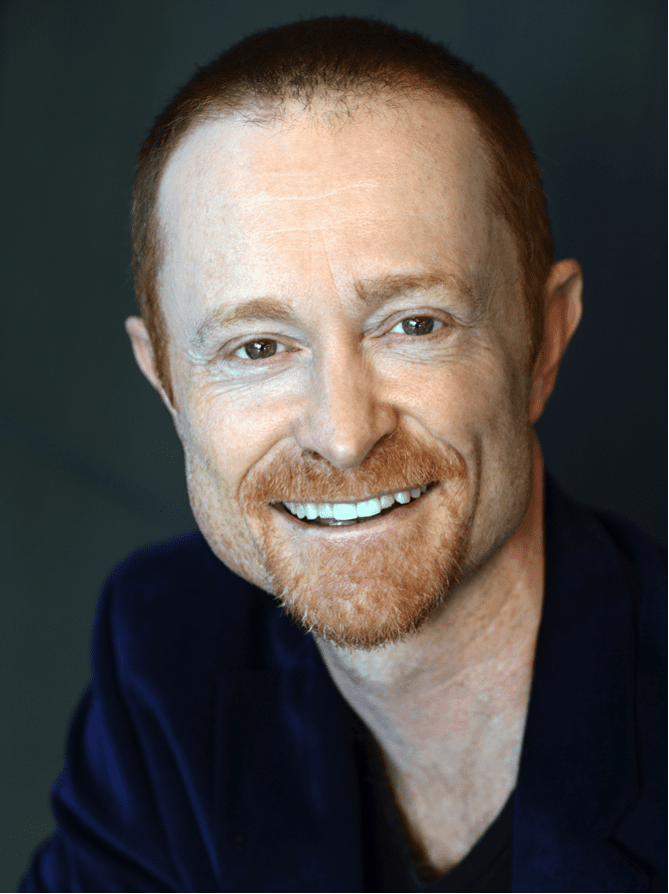 A former Consulting Actuary to Fortune 100 companies – including Sony Music, Chanel, and Exxon – David left his cushy Park Avenue job 20 years ago to build the world’s largest coaching business. He became #1 on Google for “life coaching”, serving an audience of 150,000 coaches, and coaching thousands of hours across 12 countries.
A former Consulting Actuary to Fortune 100 companies – including Sony Music, Chanel, and Exxon – David left his cushy Park Avenue job 20 years ago to build the world’s largest coaching business. He became #1 on Google for “life coaching”, serving an audience of 150,000 coaches, and coaching thousands of hours across 12 countries.
Alongside his clients’ successes, David is no stranger to overcoming challenges himself, having overcome a full collapse of his paraglider and a fractured spine, witnessing the death of his sister at age seven, severe anxiety and depression, and a national Gong Show!
He is the author of “Get Paid For Who You Are,” with a foreword by Jack Canfield. He was nominated to the exclusive Transformational Leadership Council alongside such thought leaders as Don Miguel Ruiz, John Gray, and Marianne Williamson.
David believes that the tough conversations we avoid, are our doorways to confidence, success, and love. They become the defining moments that shape our world. He coaches high-performing entrepreneurs, executives and teams – and now prison inmates – to create amazing results and deep connections. Achieve more, by focusing on less.
Love the show? Subscribe, rate, review, and share!
Join the Real Estate Investing for Women Community today:
______________________________________
To listen to the EXTRA portion of this show go to RealEstateInvestingForWomenExtra.com
To see this program in video:
Search on Roku for Real Estate Investing 4 Women or go to this link: https://blissfulinvestor.com/biroku
On YouTube go to Real Estate Investing for Women
Moneeka Sawyer is often described as one of the most blissful people you will ever meet. She has been investing in Real Estate for over 20 years, so has been through all the different cycles of the market. Still, she has turned $10,000 into over $5,000,000, working only 5-10 hours per MONTH with very little stress.
While building her multi-million dollar business, she has traveled to over 55 countries, dances every single day, supports causes that are important to her, and spends lots of time with her husband of over 20 years.
She is the international best-selling author of the multiple award-winning books “Choose Bliss: The Power and Practice of Joy and Contentment” and “Real Estate Investing for Women: Expert Conversations to Increase Wealth and Happiness the Blissful Way.”
Moneeka has been featured on stages including Carnegie Hall and Nasdaq, radio, podcasts such as Achieve Your Goals with Hal Elrod, and TV stations including ABC, CBS, FOX, and the CW, impacting over 150 million people.

